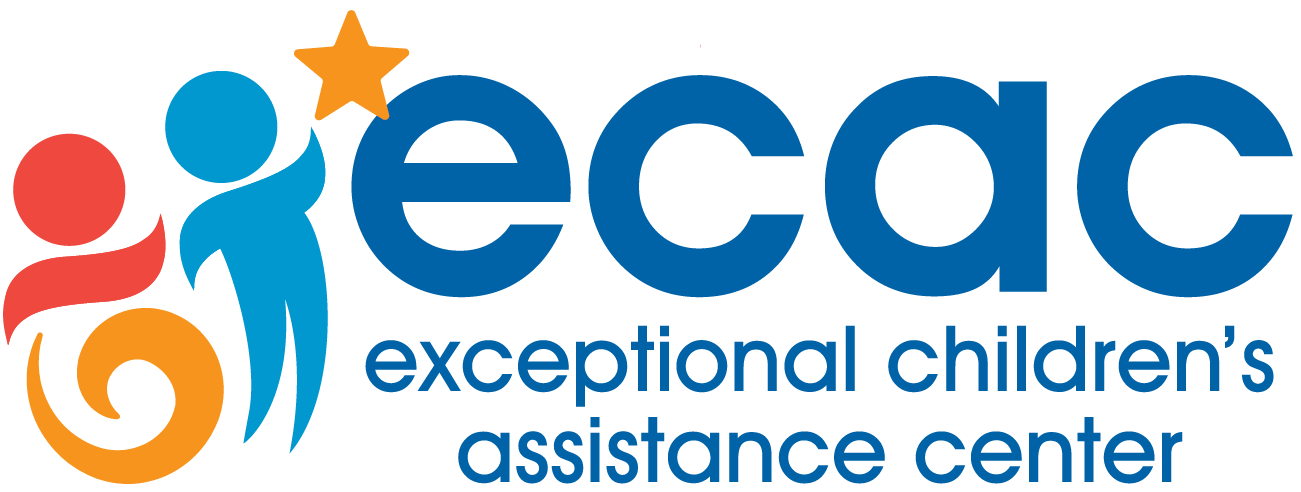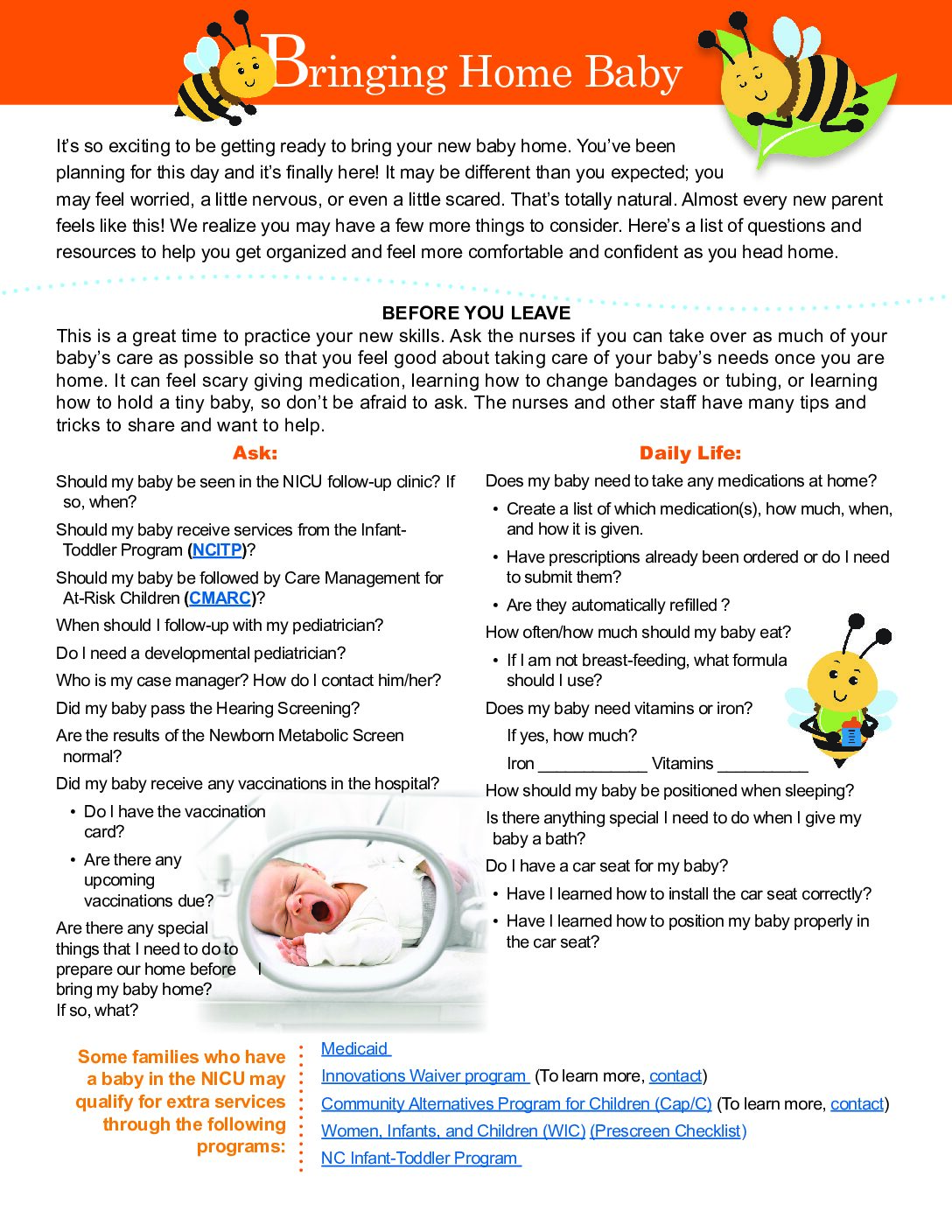
Bringing Home Baby
It’s so exciting to be getting ready to bring your new baby home. You’ve been planning for this day and it’s finally here! It may be different than you expected; you may feel worried, a little nervous, or even a little scared. That’s totally natural. Almost every new parent feels like this! We realize you may have a few more things to consider. Here’s a list of questions and resources to help you get organized and feel more comfortable and confident as you head home.
Categories: Early Childhood, Early Intervention
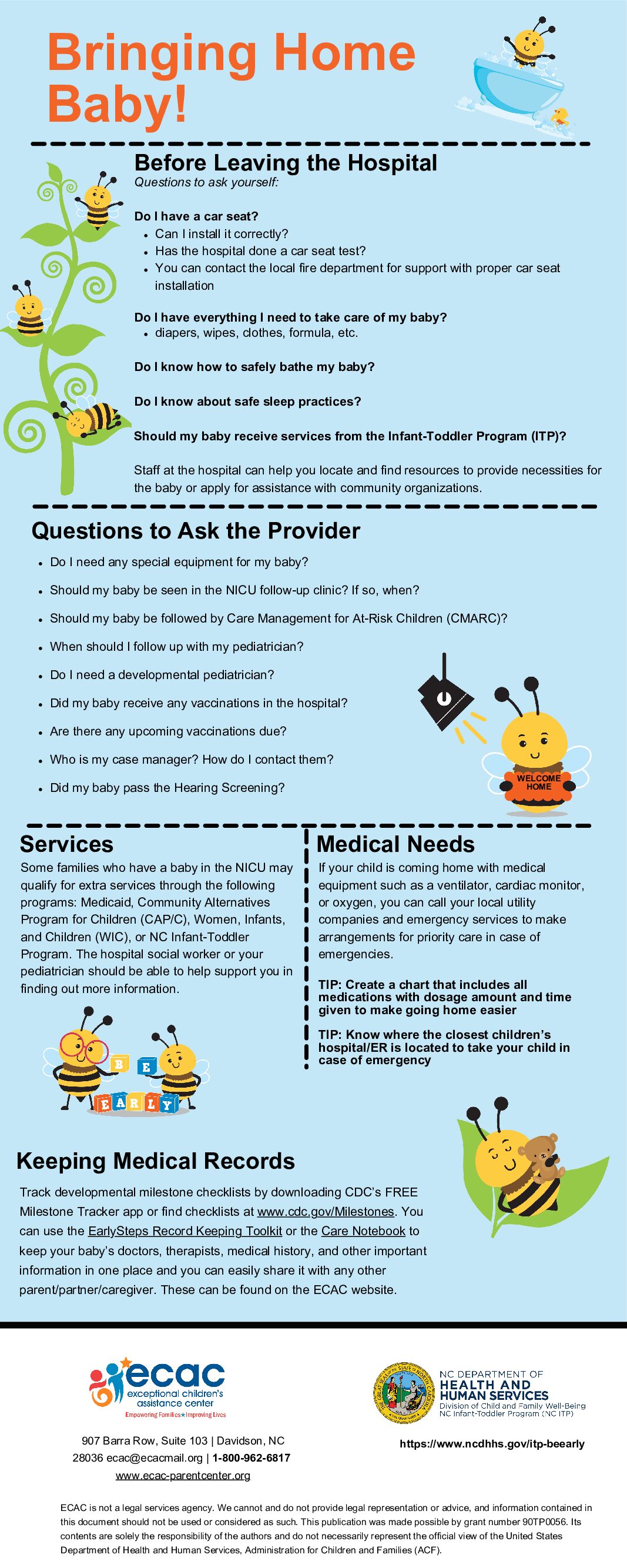
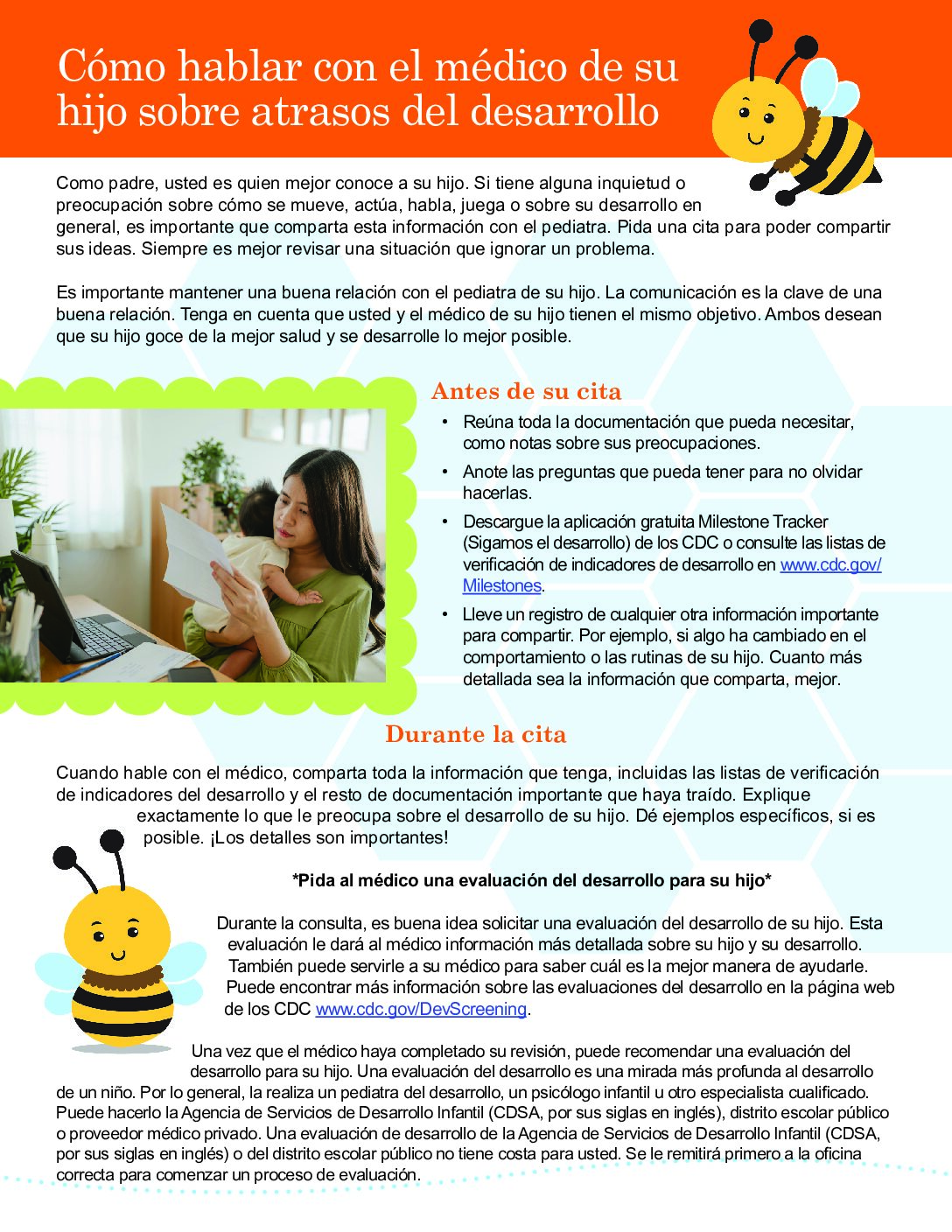
Cómo hablar con el médico de su hijo sobre atrasos del desarrollo (Talking with Your Child’s Doctor about Developmental Concerns)
Como padre, usted es quien mejor conoce a su hijo. Si tiene alguna inquietud o preocupación sobre cómo se mueve, actúa, habla, juega o sobre su desarrollo en general, es importante que comparta esta información con el pediatra.
Categories: Early Childhood, Early Intervention, Spanish
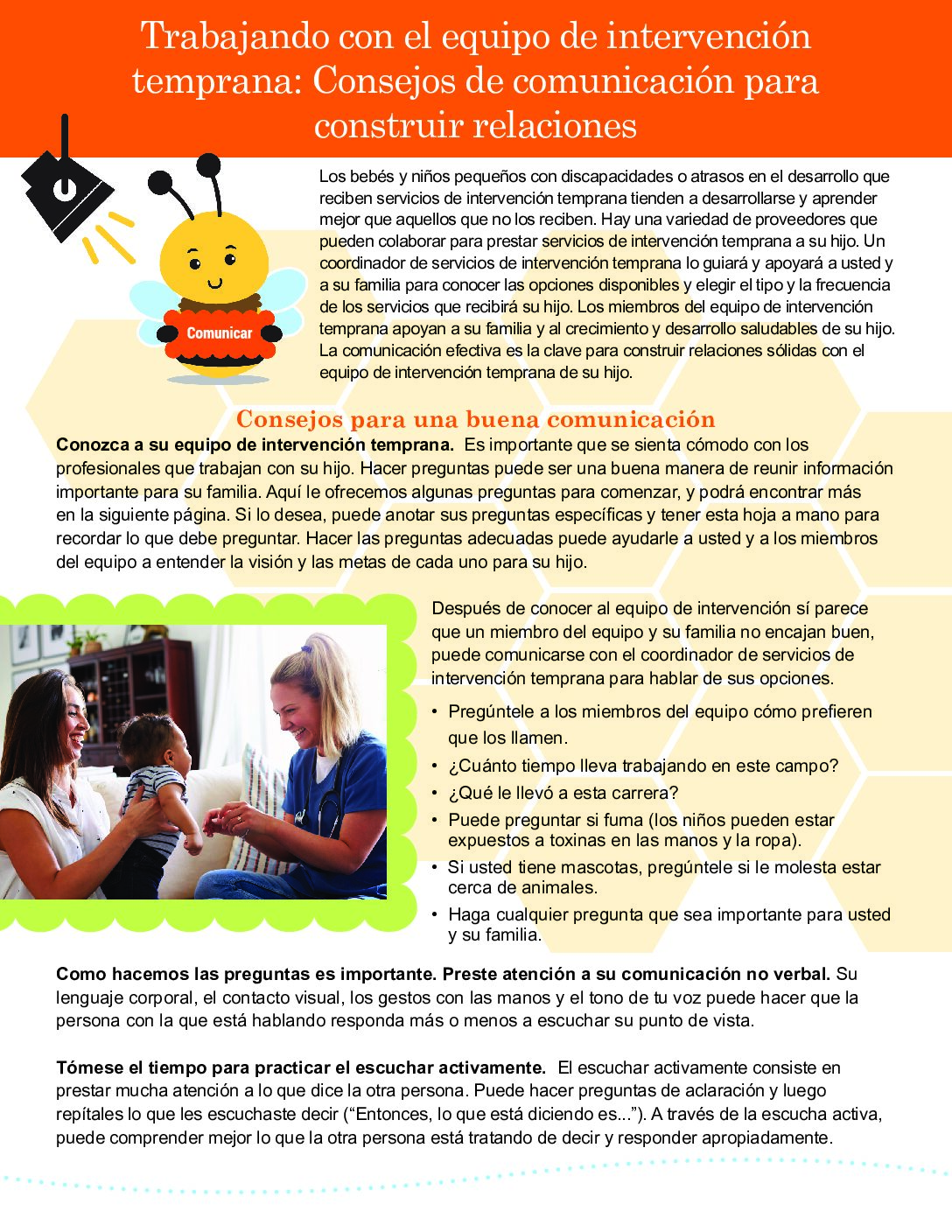
Cómo trabajar con proveedores de intervencióntemprana: Consejos de comunicación para construir relaciones (How to Work with Early Intervention Providers: Communication Tips for Building Relationships)
Los bebés y niños pequeños con discapacidades o atrasos en el desarrollo que reciben servicios de intervención temprana tienden a desarrollarse y aprender mejor que aquellos que no los reciben.
Categories: Early Childhood, Early Intervention, Spanish
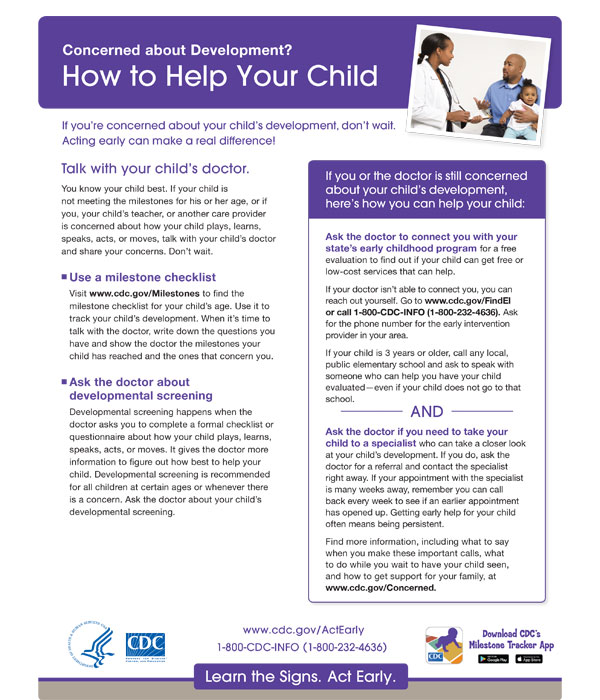
Concerned about Development? How to Help Your Child
You know your child best. If your child is not meeting the milestones for his or her age, or if you, your child’s teacher, or another care provider is concerned about how your child plays...
Categories: Early Childhood, Early Intervention
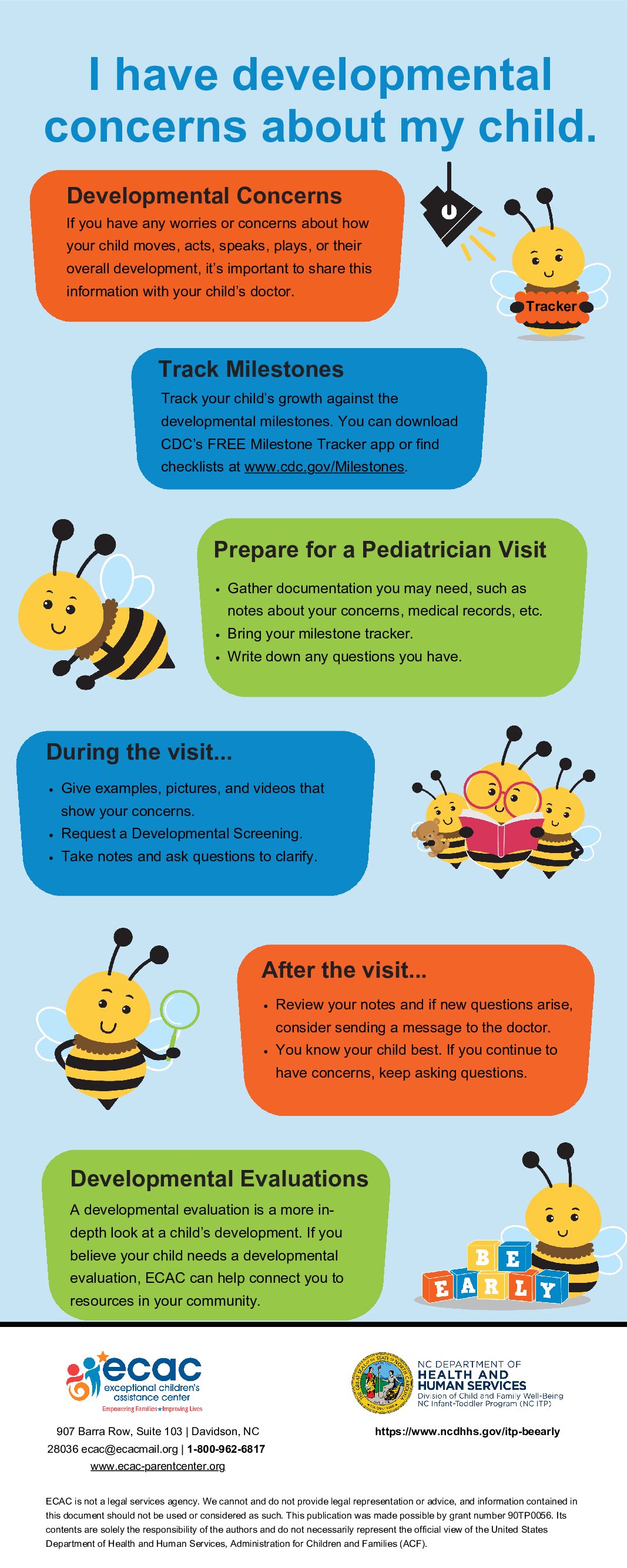
Developmental Concerns Infographic
If you have any worries or concerns about how your child moves, acts, speaks, plays, or their overall development, it’s important to share this information with your child’s doctor.
Categories: Development Delay, Early Childhood, Early Intervention
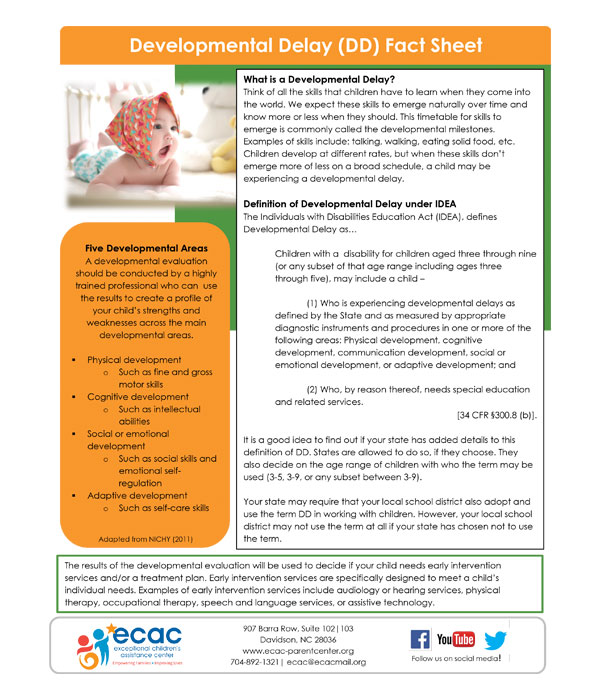
Developmental Delay (DD) Fact Sheet
Think of all the skills that children have to learn when they come into the world. We expect these skills to emerge naturally over time and know more or less when they should...
Categories: Development Delay, Early Childhood, Early Intervention
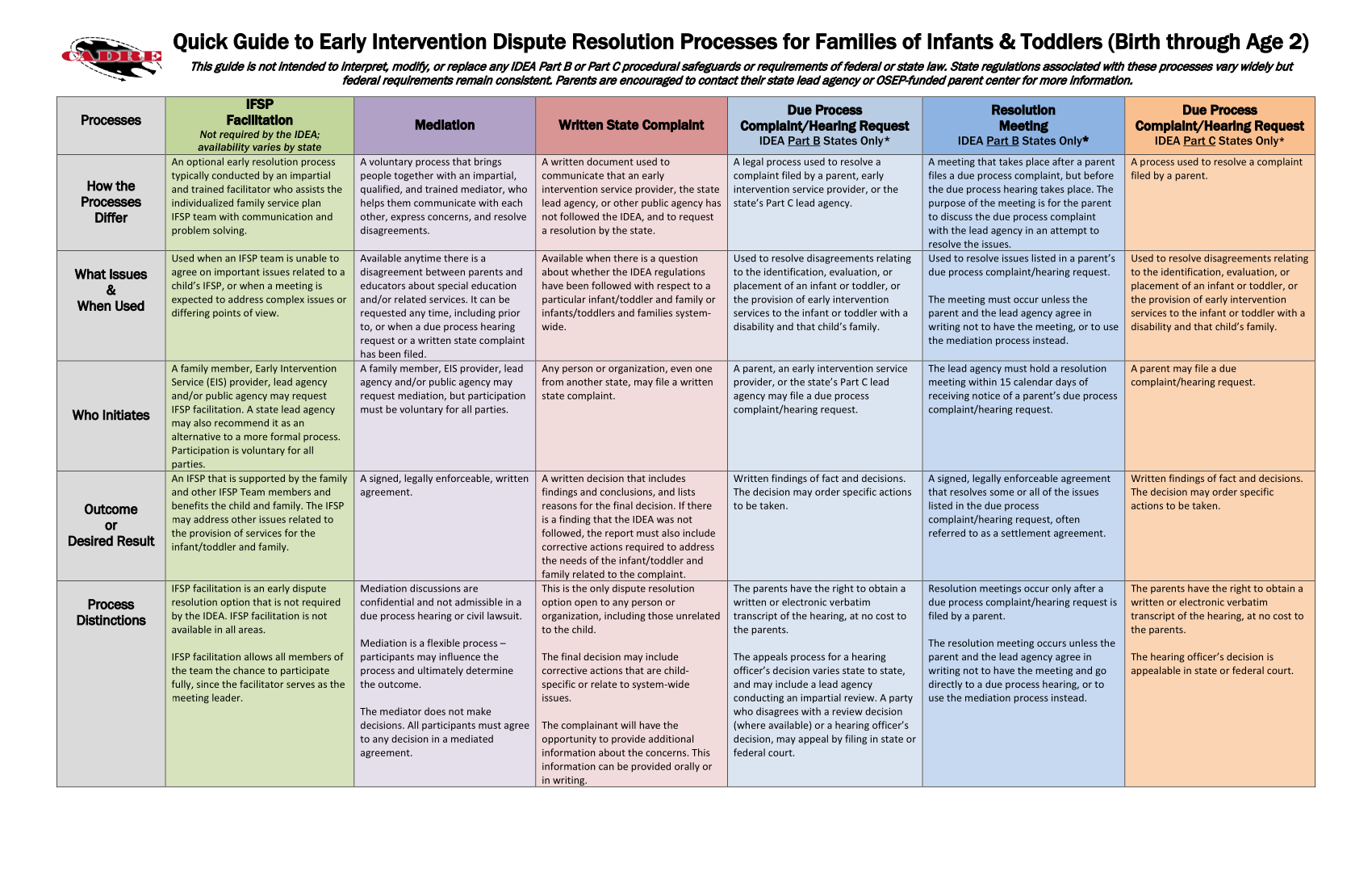
Early Intervention Dispute Resolution Process Comparison Chart
This easy to use comparison chart looks at dispute resolution processes from a variety of perspectives.
Categories: Conflict Resolution, Early Intervention, Parent Rights
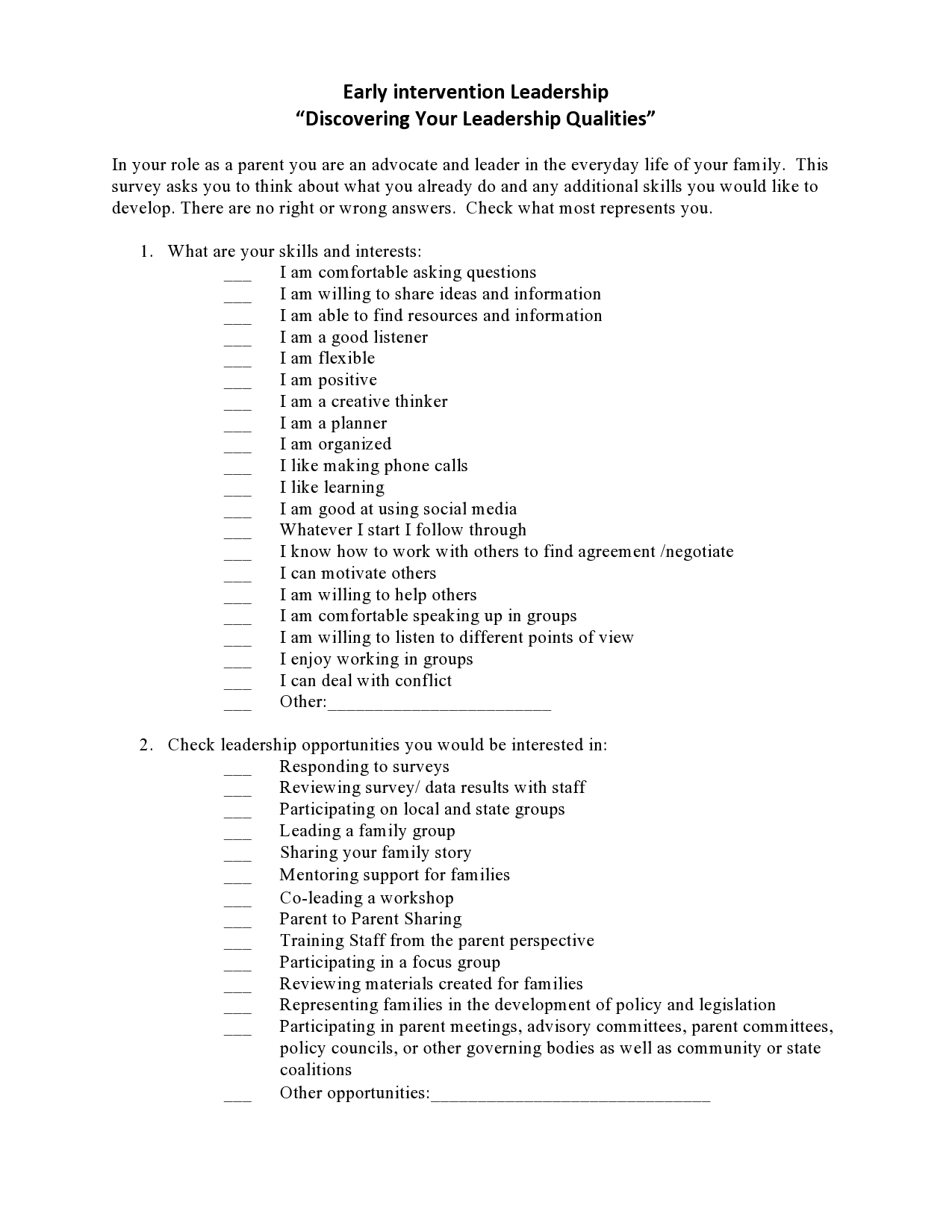
Early Intervention Leadership Assessment
In your role as a parent you are an advocate and leader in the everyday life of your family. This survey asks you to think about what you already do and any additional skills you would like to develop.
Categories: Early Intervention, Family Engagement
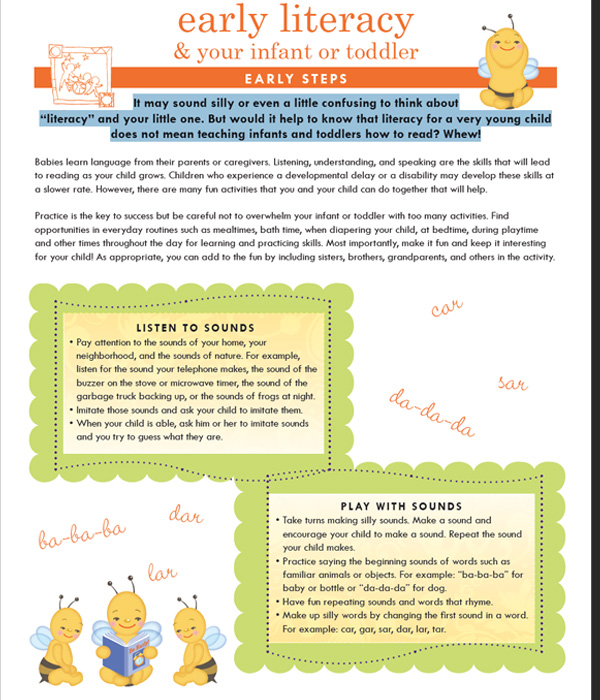
Early Literacy and Your Infant or Toddler
It may sound silly or even a little confusing to think about “literacy” and your little one. But would it help to know that literacy for a very young child does not mean teaching infants and toddlers how to read? Whew!
Categories: Early Childhood, Early Intervention
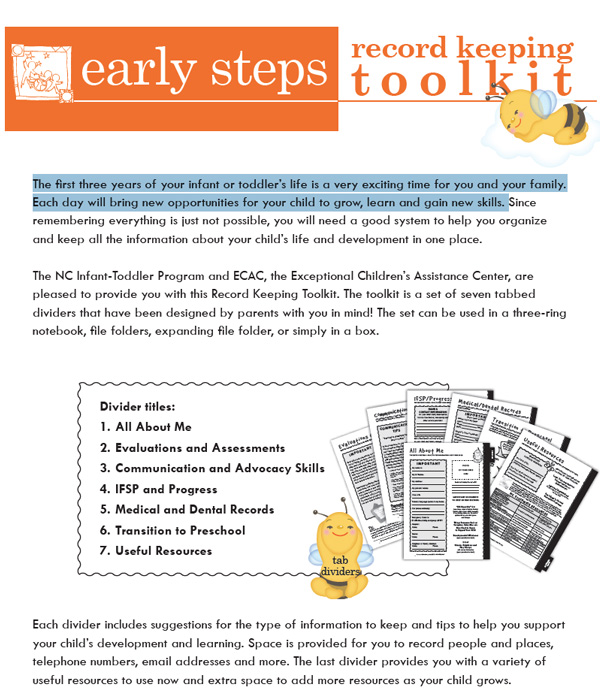
Early Steps Record Keeping Toolkit
The first three years of your infant or toddler’s life is a very exciting time for you and your family. Each day will bring new opportunities for your child to grow, learn and gain new skills.
Categories: Early Intervention
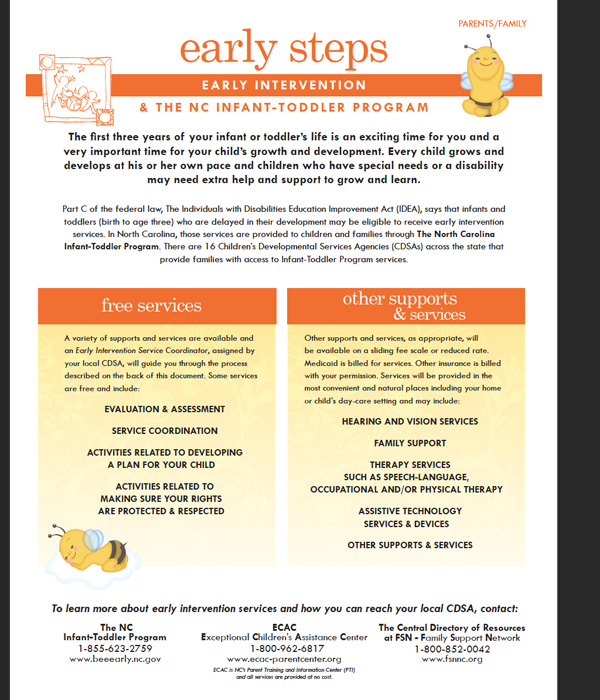
Early Steps: Early Intervention and the NC Infant-Toddler Program
The first three years of your infant or toddler’s life is an exciting time for you and a very important time for your child’s growth and development.
Categories: Early Childhood, Early Intervention
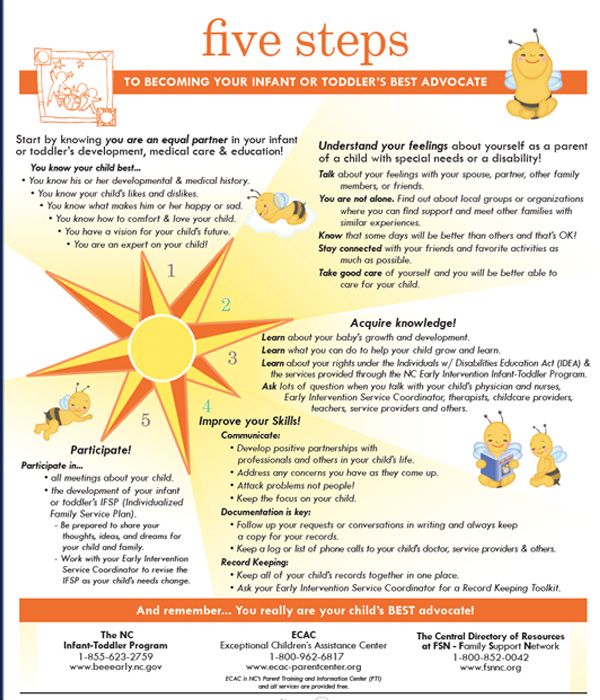
Five Steps to Becoming Your Infant or Toddler's Best Advocate
Start by knowing you are an equal partner in your infant or toddler’s development, medical care and education!
Categories: Advocacy, Early Childhood, Early Intervention
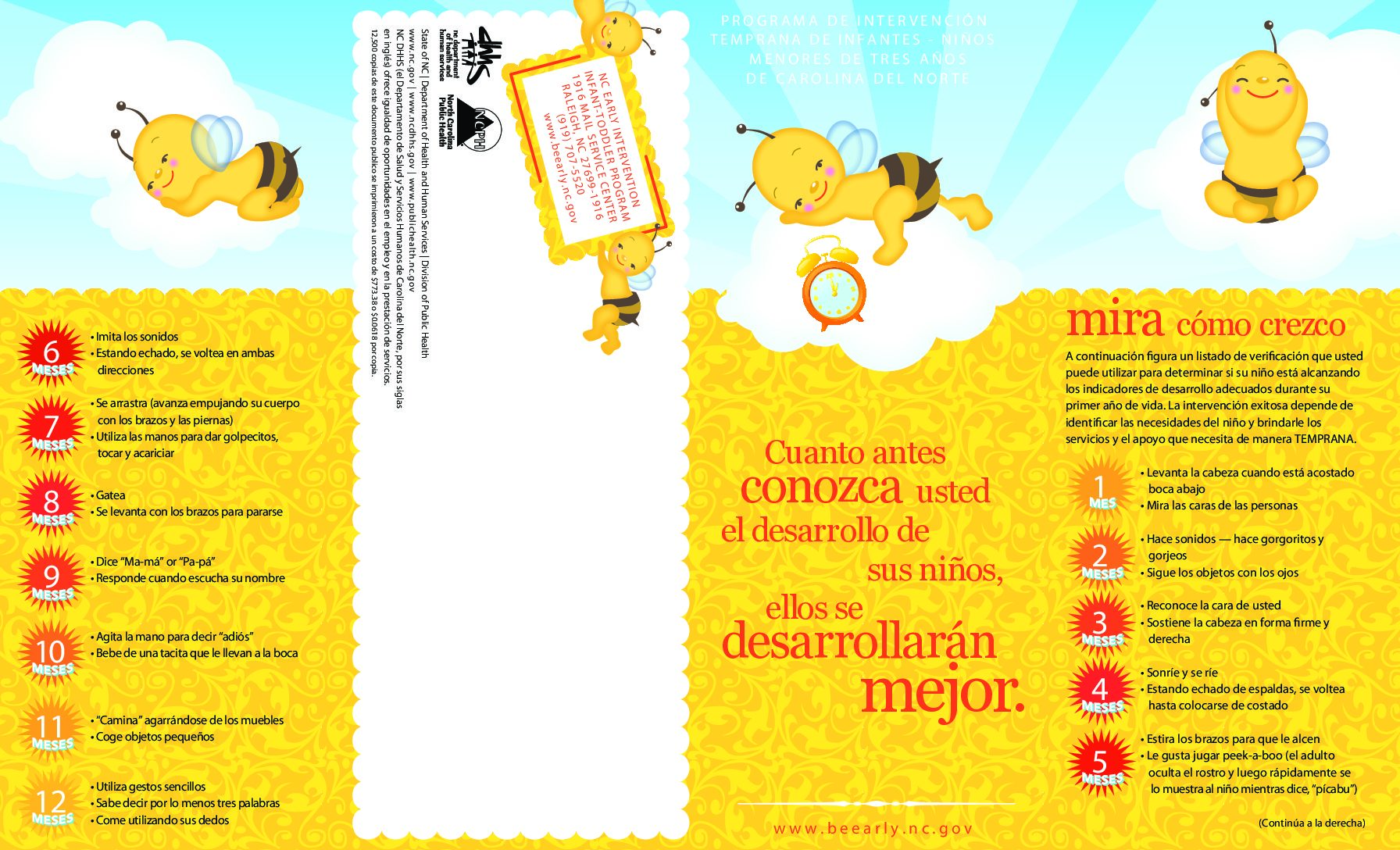
Folleto del Programa de Intervención Temprana para Infantes y Niños Pequeños de Carolina del Norte (NC Early Intervention Infant Toddler Program Brochure)
The Be Early Brochure provides basic information about the Infant Toddler Program and what to do if there are concerns about a child's development. Also includes a checklist of developmental milestones for the first year of life
Categories: Development Delay, Early Intervention, Spanish
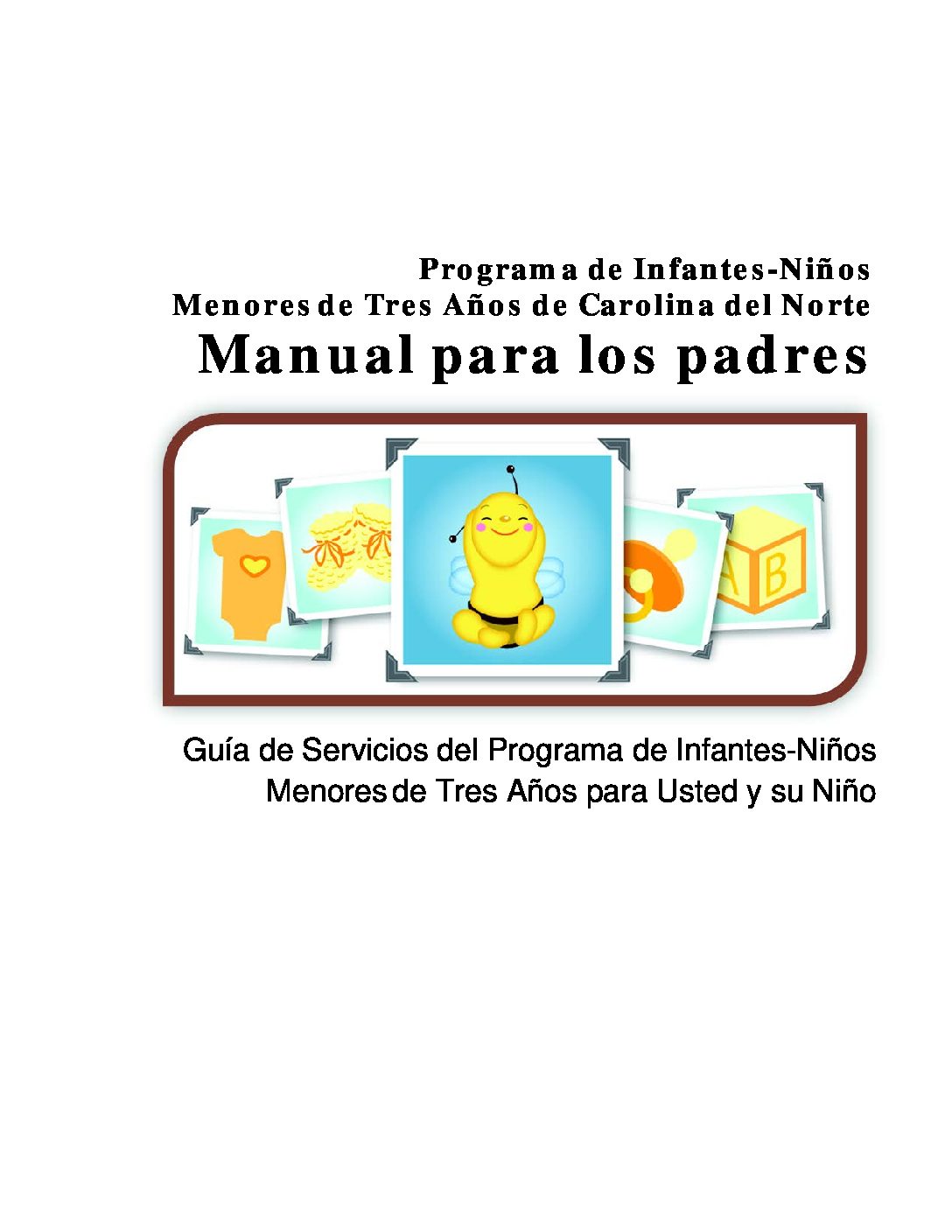
Manual para Padres del Programa de Infantes y Niños Pequeños de Carolina del Norte (North Carolina Infant-Toddler Program Parent Handbook)
The Nc ITP Parent Handbook helps parents understand the role and philosophy of the Infant-Toddler Program and answers key questions concerning its policies and procedures.
Categories: Early Intervention, Spanish
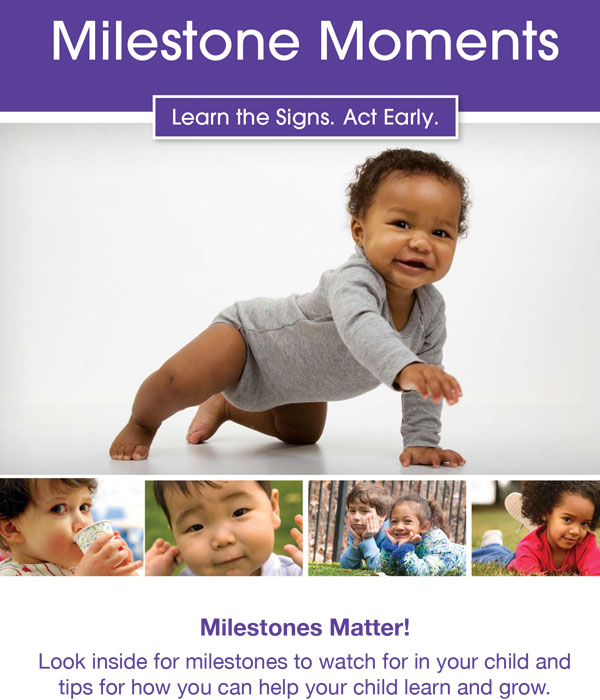
Milestone Moments
Take this booklet with you and talk to your child’s doctor at every well-child visit about the milestones your child has reached and what to expect next...
Categories: Early Childhood, Early Intervention
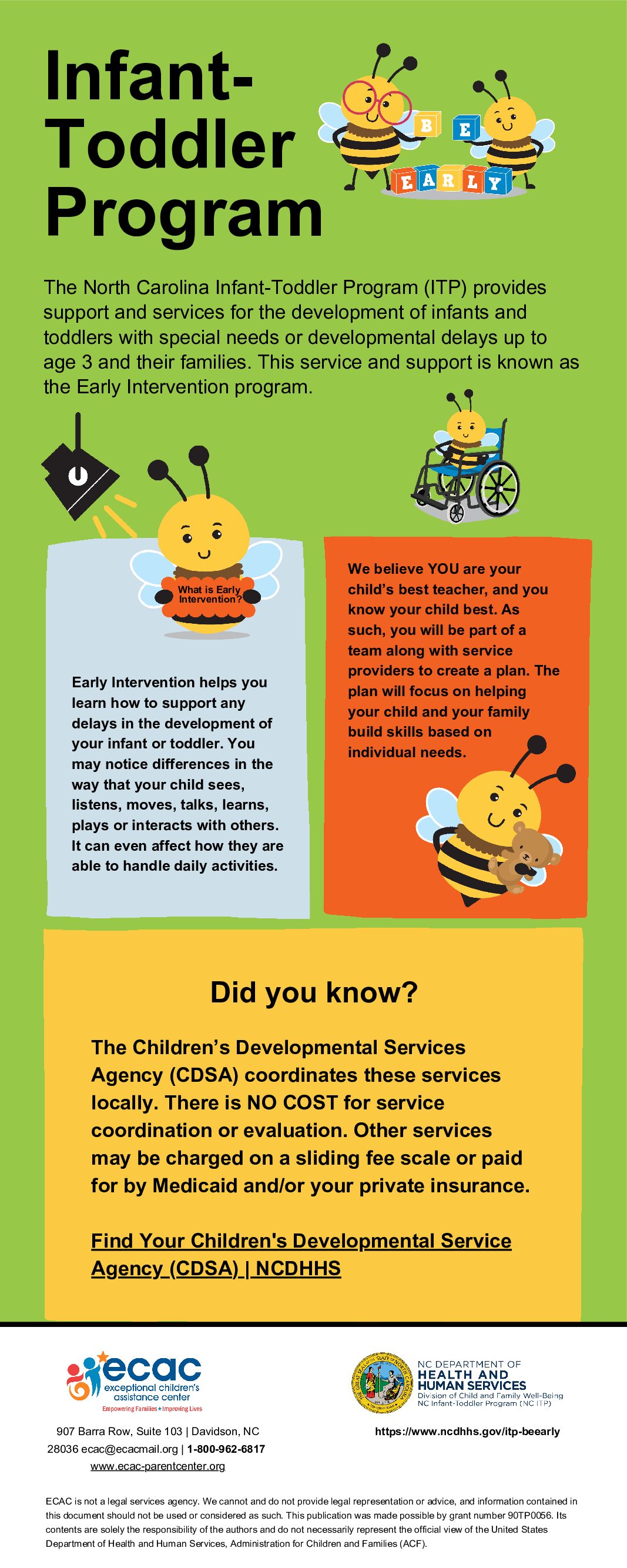
NC Early Intervention Infant Toddler Program Infographic (English)
The Infant-Toddler Program provides support and services for the development of infants and toddlers with special need or developmental delays up to age 3 and their families. This service and support is known as the Early Intervention program.
Categories: Development Delay, Early Childhood, Early Intervention
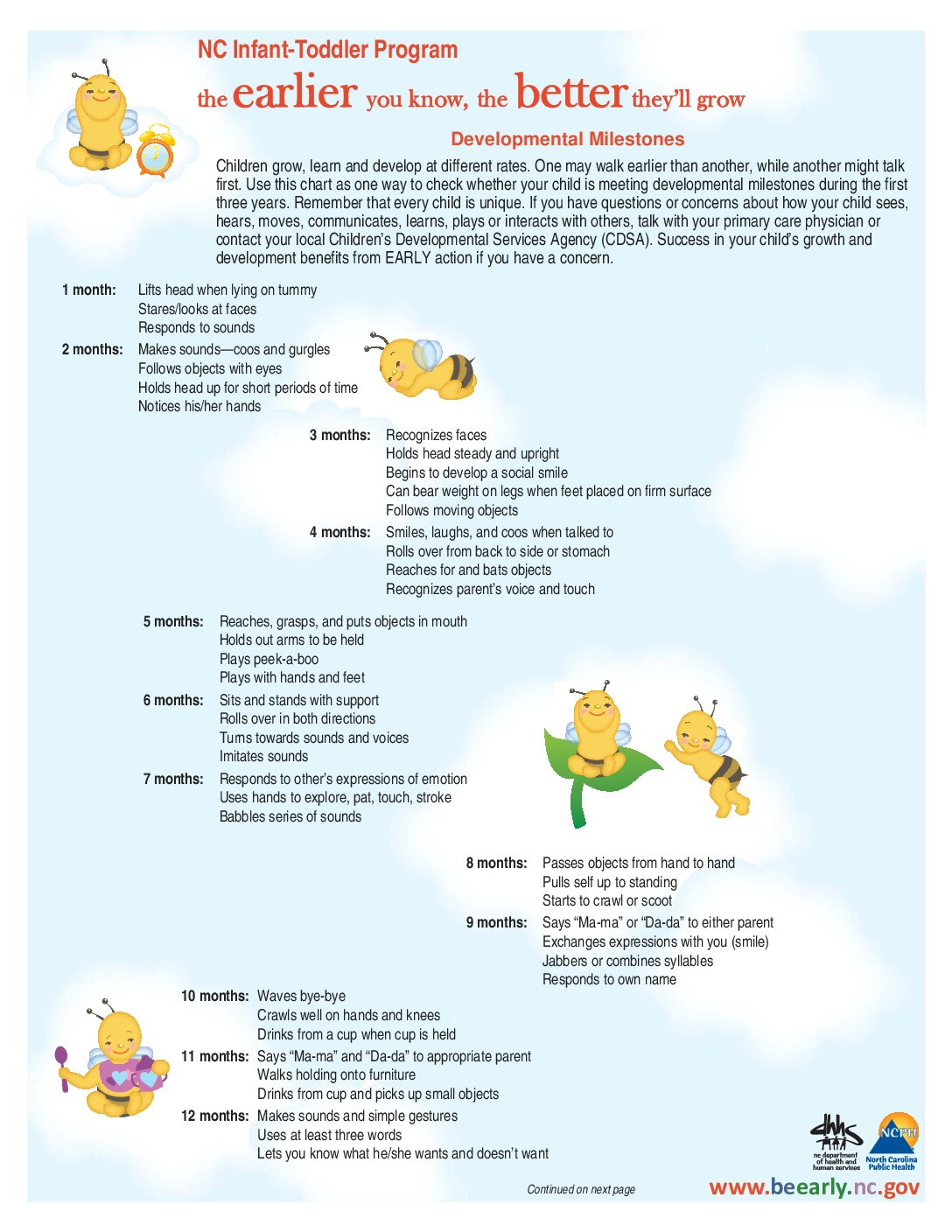
NC Infant-Toddler Program Developmental Milestones
The Milestones Chart helps parents determine whether their child is meeting developmental milestones during the first three years.
Categories: Development Delay, Early Childhood, Early Intervention, Speech and Language
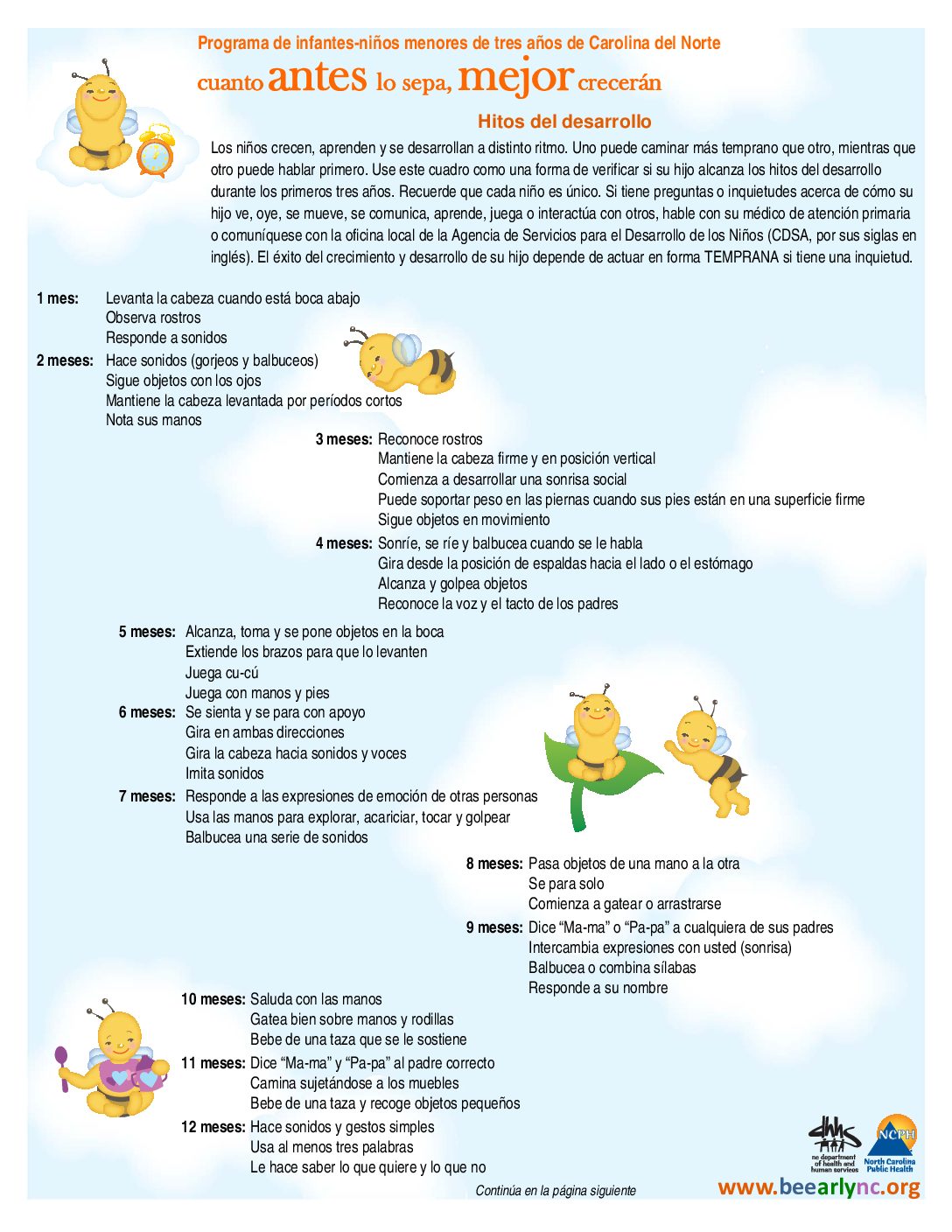
NC Infant-Toddler Program Developmental Milestones (Spanish)
The NCITP Milestones Chart helps parents determine whether their child is meeting developmental milestones during the first three years.
Categories: Development Delay, Speech and Language, Spanish, Early Intervention
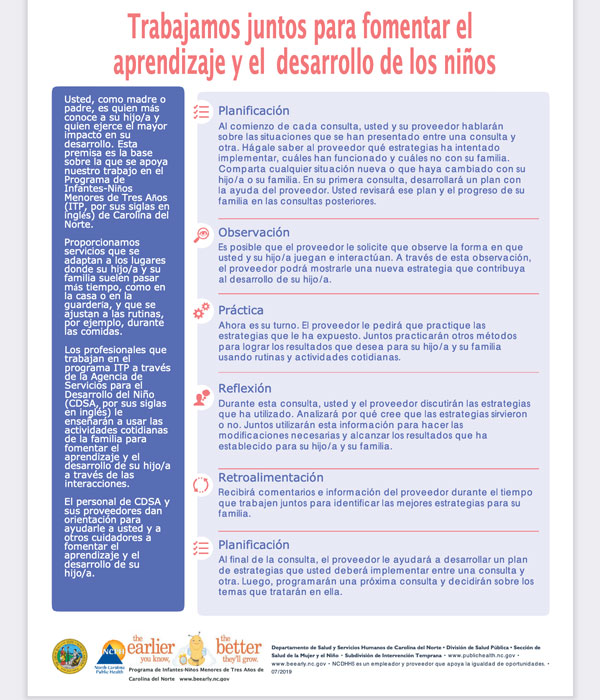
NCITP: Trabajando Juntos para Apoyar el Aprendizaje y el Desarrollo de los Niños (NCITP: Working Together to Support Children's Learning and Development)
Working Together to Support Children's Learning and Development outlines how CDSA staff and community providers use coaching to help caregivers support their children's learning and development.
Categories: Early Intervention, Family Engagement, Spanish
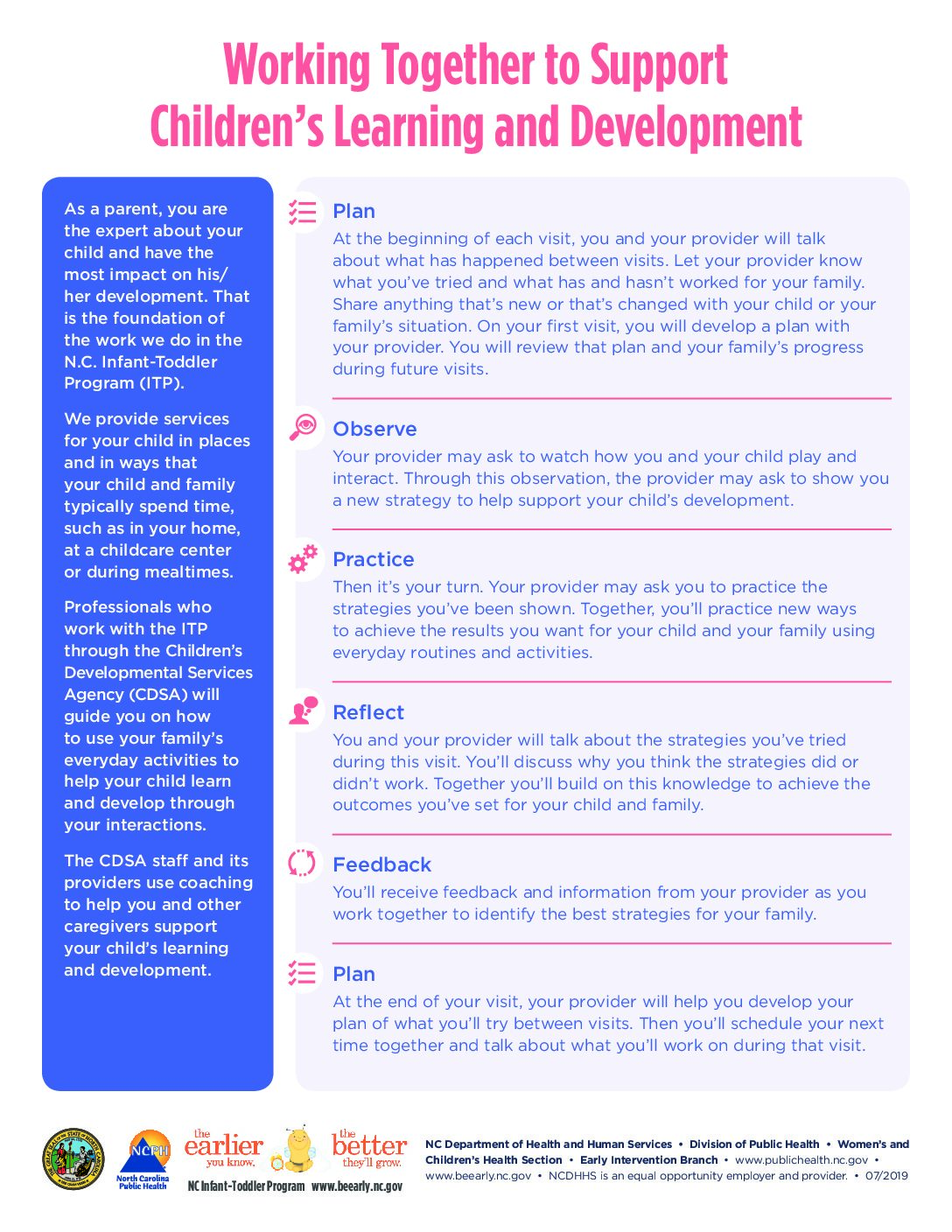
NCITP: Working Together to Support Children's Learning and Development
Working Together to Support Children's Learning and Development outlines how CDSA staff and community providers use coaching to help caregivers support their children's learning and development.
Categories: Family Engagement, Early Intervention
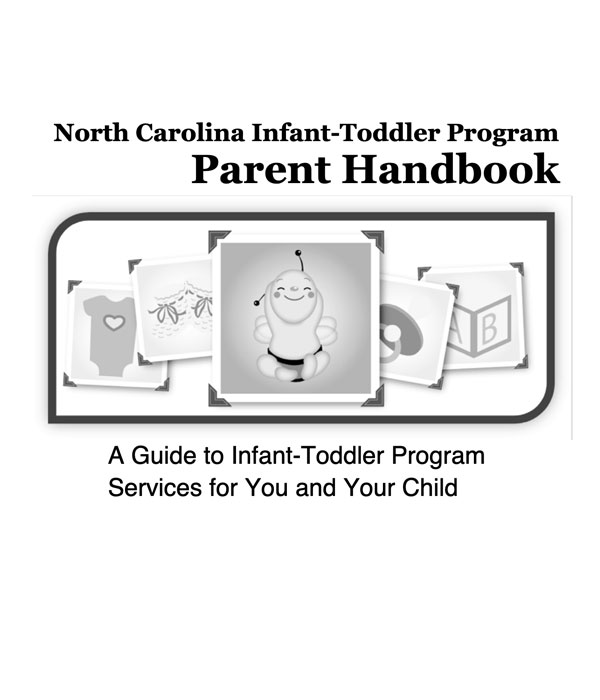
North Carolina Infant-Toddler Program Parent Handbook
The NC ITP Parent Handbook helps parents understand the role and philosophy of the Infant-Toddler Program and answers key questions concerning its policies and procedures.
Categories: Early Childhood, Early Intervention
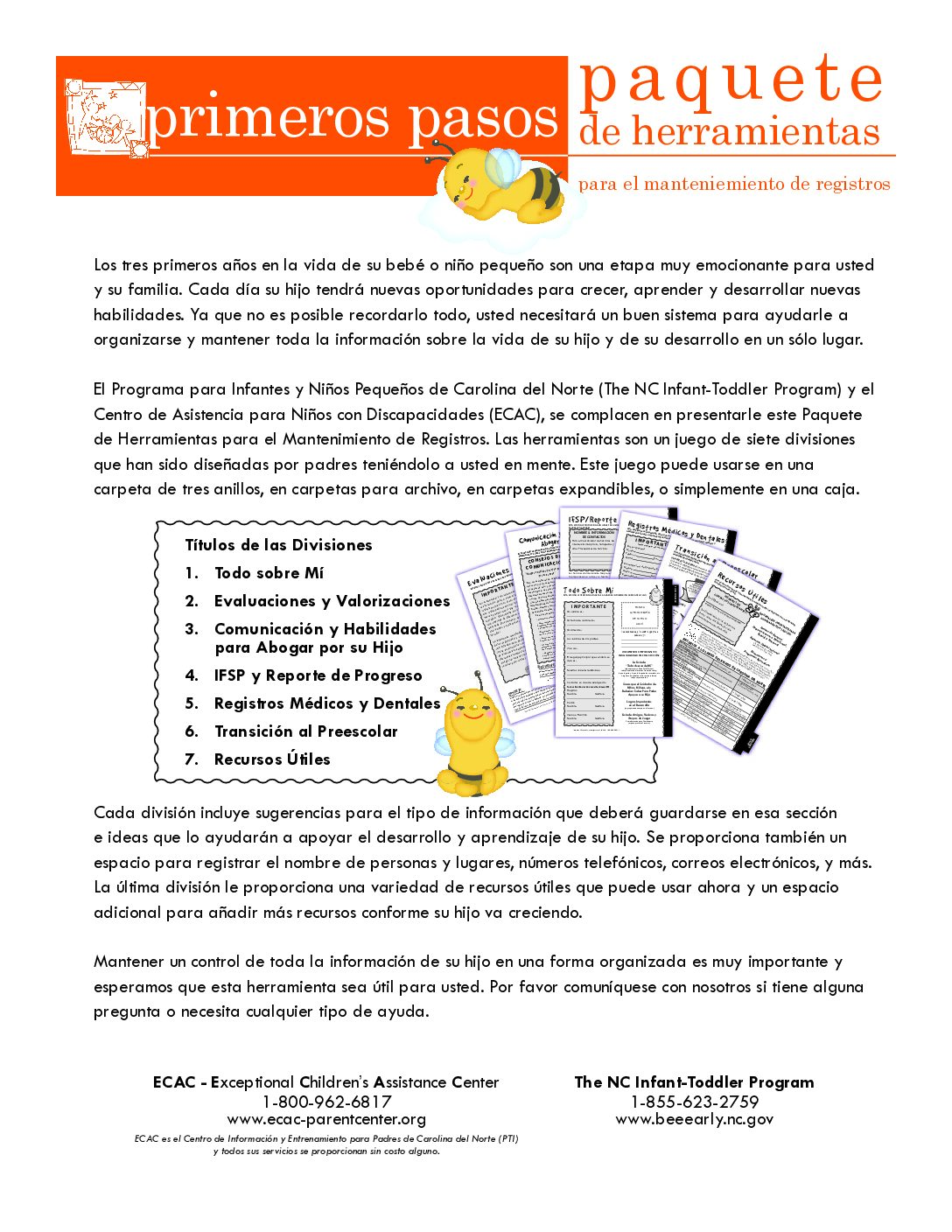
Primeros pasos paquete de herramientas para el manteniemeinto de registros (Early Steps Record Keeping Toolkit)
Categories: Early Intervention, Spanish
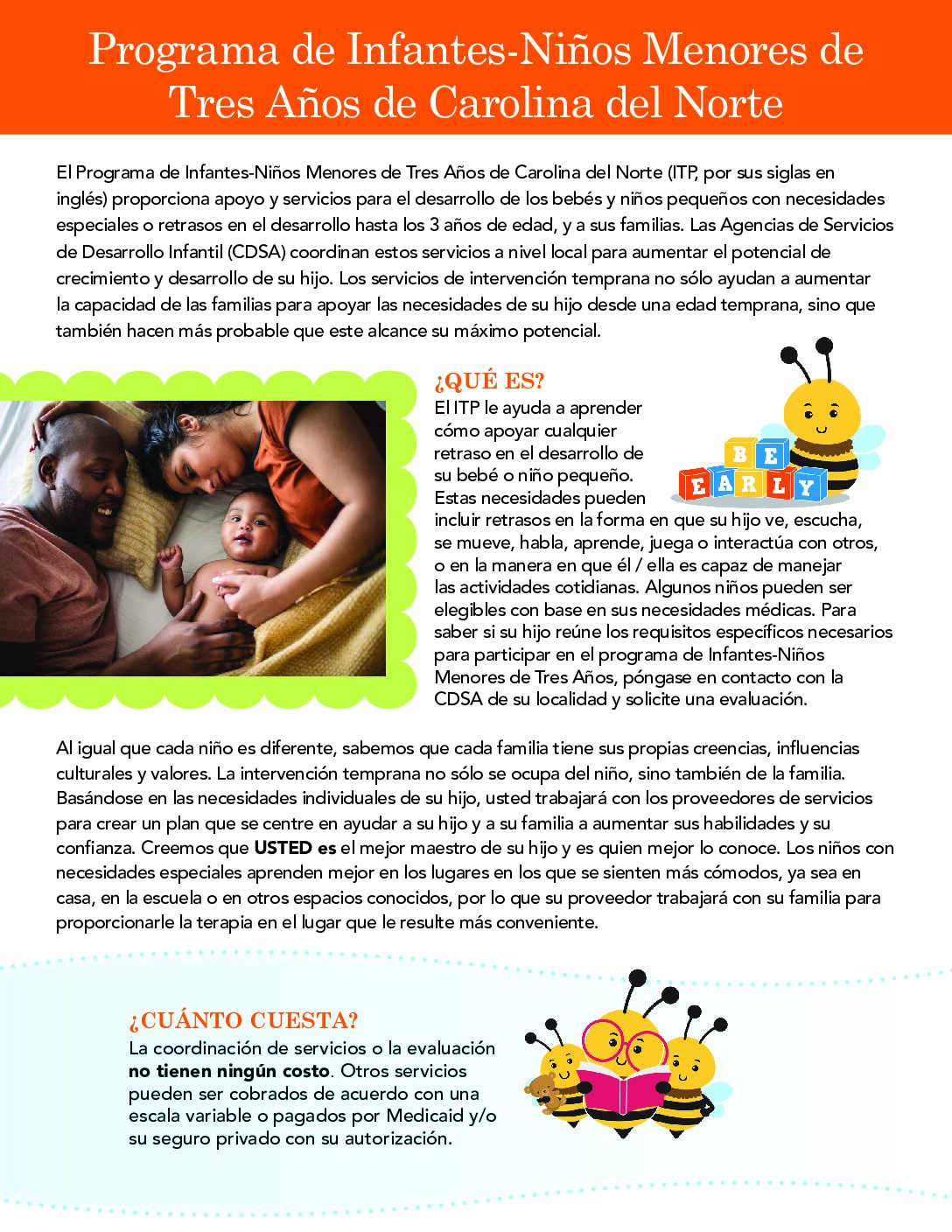
Programa de Infantes-Niños Menores de Tres Años de Carolina del Norte (North Carolina Infant-Toddler Program)
El Programa de Infantes-Niños Menores de Tres Años de Carolina del Norte El Programa de Infantes-Niños Menores de Tres Años de Carolina del Norte (ITP, por sus siglas en inglés) proporciona apoyo y servicios para el desarrollo de los bebés y niños pequeños con necesidades especiales o retrasos en el desarrollo hasta los 3 años de edad, y a sus familias. Las Agencias de Servicios de Desarrollo Infantil (CDSA) coordinan estos servicios a nivel local para aumentar el potencial de crecimiento y desarrollo de su hijo. Los servicios de intervención temprana no sólo ayudan a aumentar la capacidad de las familias para apoyar las necesidades de su hijo desde una edad temprana, sino que también hacen más probable que este alcance su máximo potencial.
Categories: Early Childhood, Early Intervention, Spanish
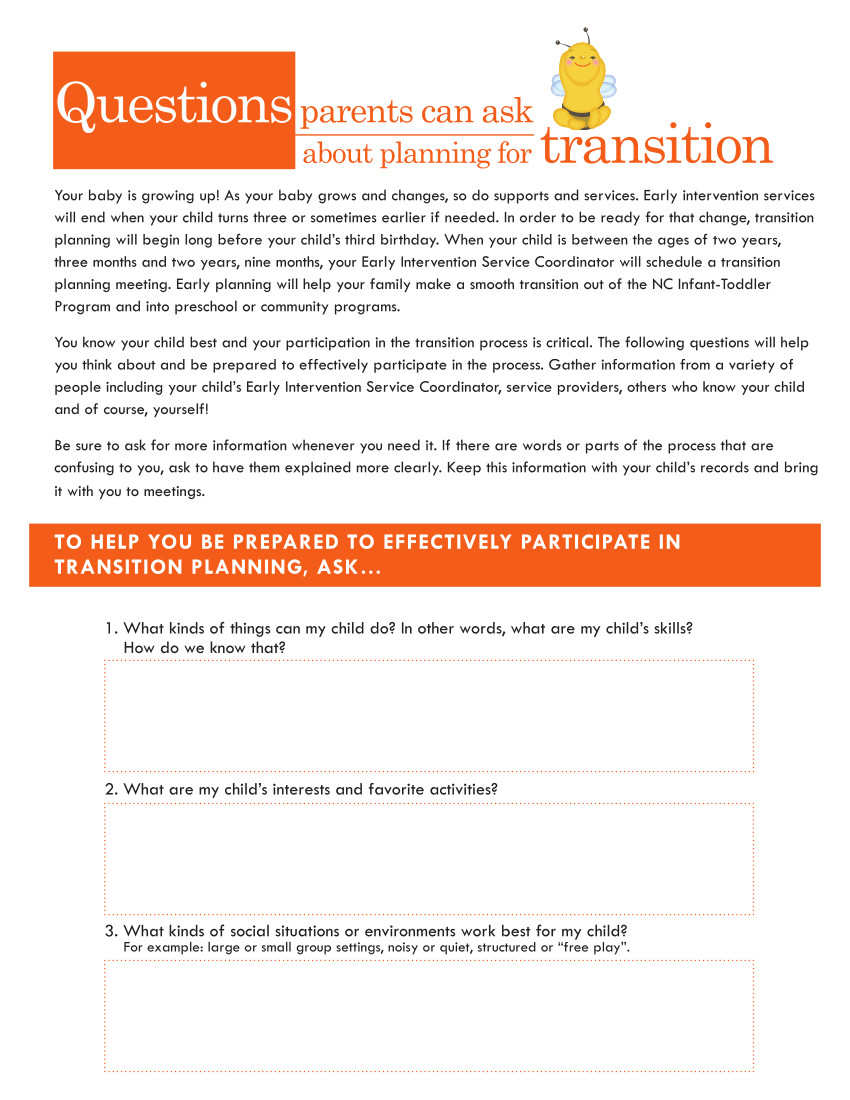
Questions Parents Can Ask About Planning for Transition to Preschool
You know your child best and your participation in the transition process is critical. The following questions will help you think about and be prepared to effectively participate in the process.
Categories: Early Intervention, Transitions
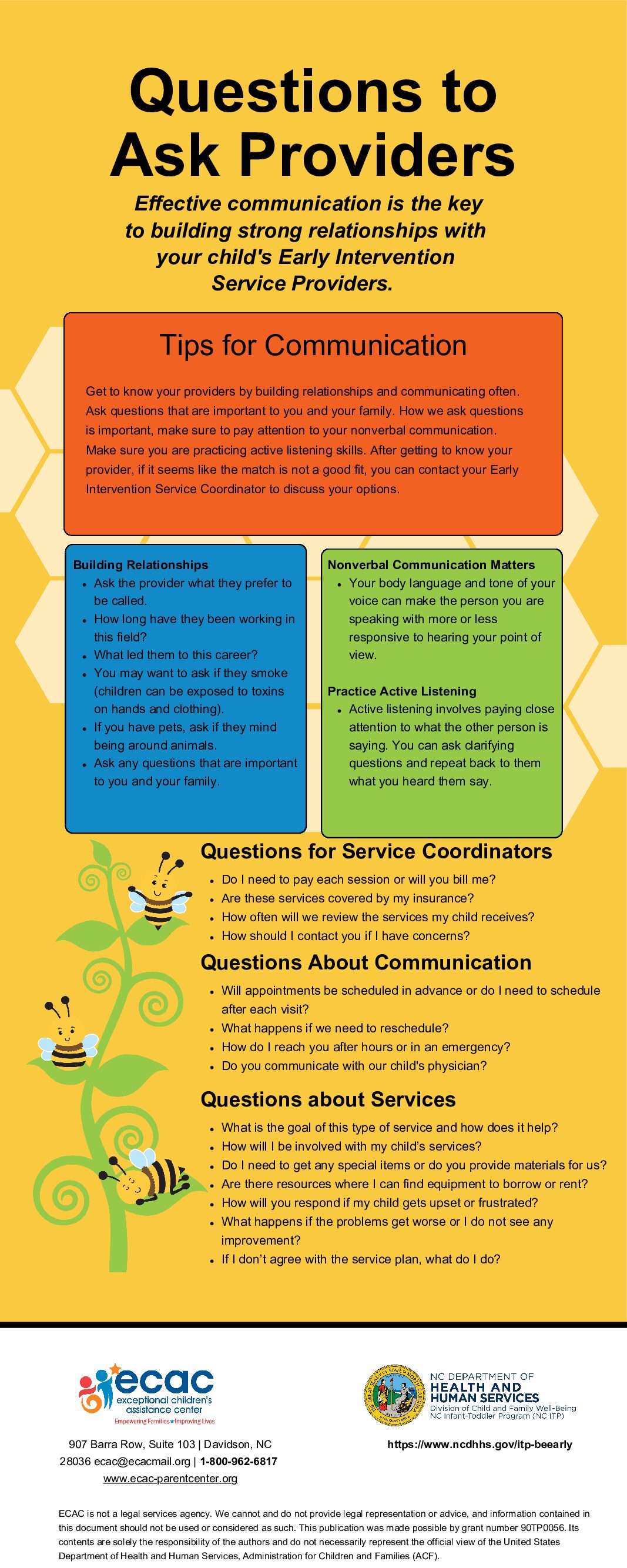
Questions to Ask Providers Infographic
Categories: Early Childhood, Early Intervention
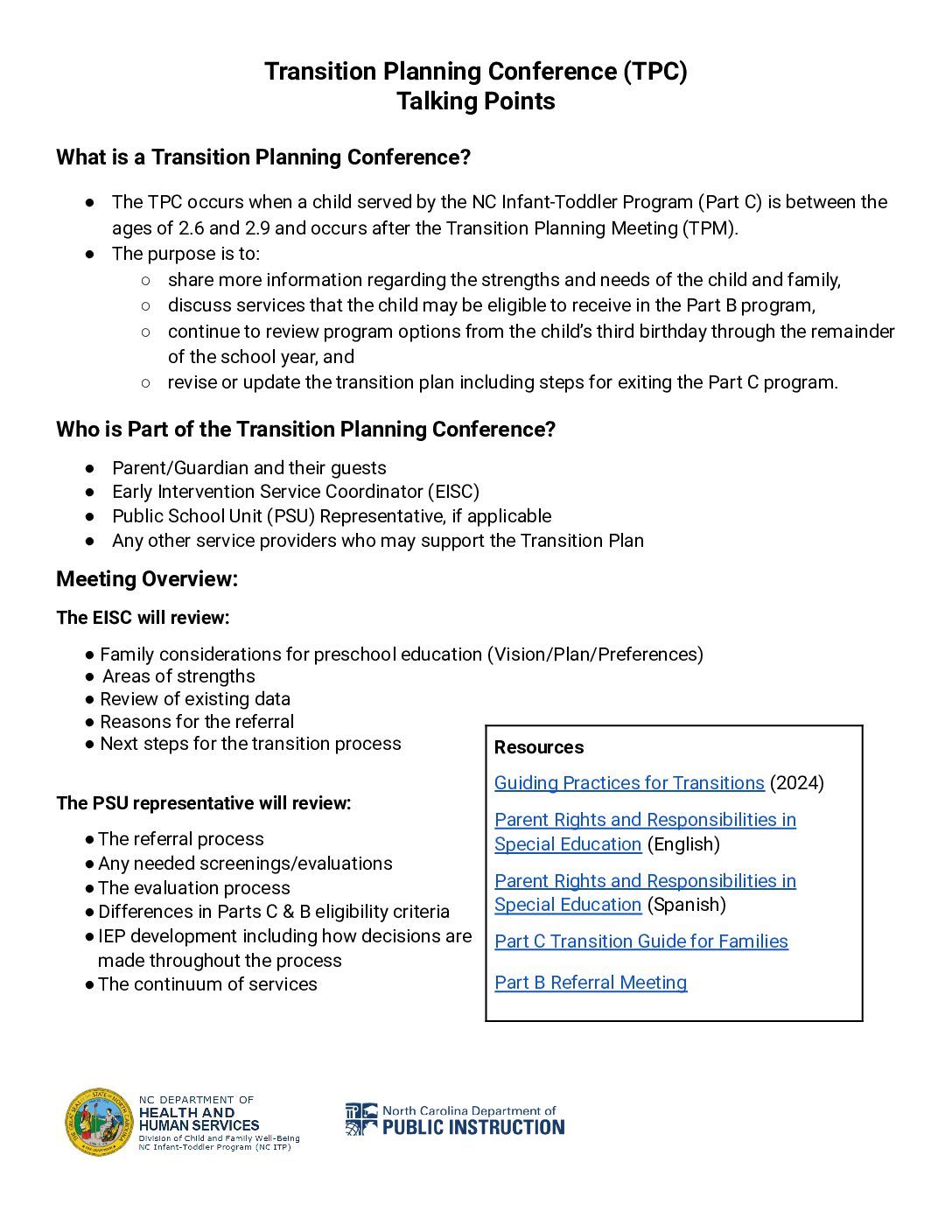
Talking Points: Transition Planning Conference (TPC)
The TPC occurs when a child served by the NC Infant-Toddler Program (Part C) is between the ages of 2.6 and 2.9 and occurs after the Transition Planning Meeting (TPM).
Categories: Early Childhood, Early Intervention, Transitions
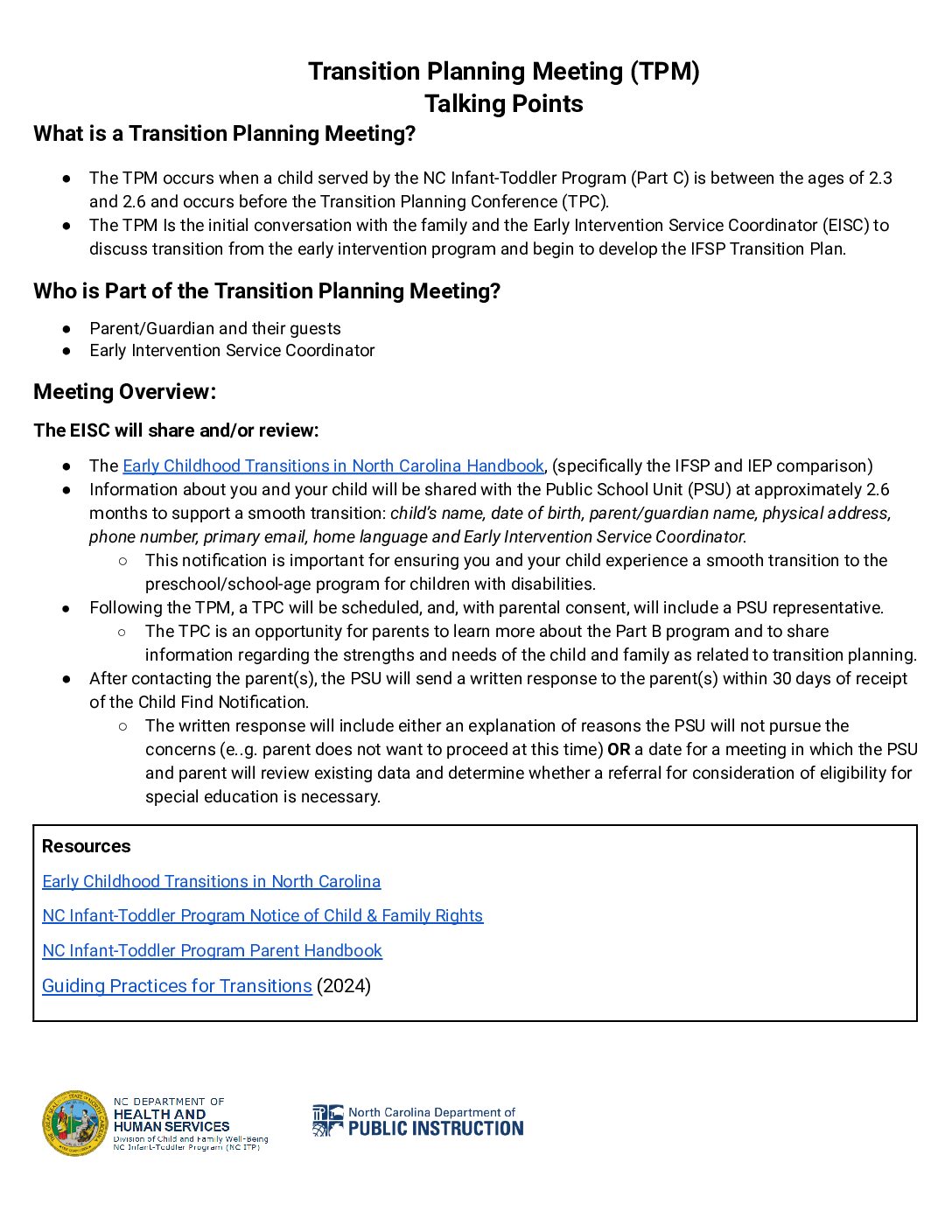
Talking Points: Transition Planning Meeting (TPM)
The TPM occurs when a child served by the NC Infant-Toddler Program (Part C) is between the ages of 2.3 and 2.6 and occurs before the Transition Planning Conference (TPC). The TPM Is the initial conversation with the family and the Early Intervention Service Coordinator (EISC) to discuss transition from the early intervention program and begin to develop the IFSP Transition Plan.
Categories: Early Childhood, Early Intervention, Transitions
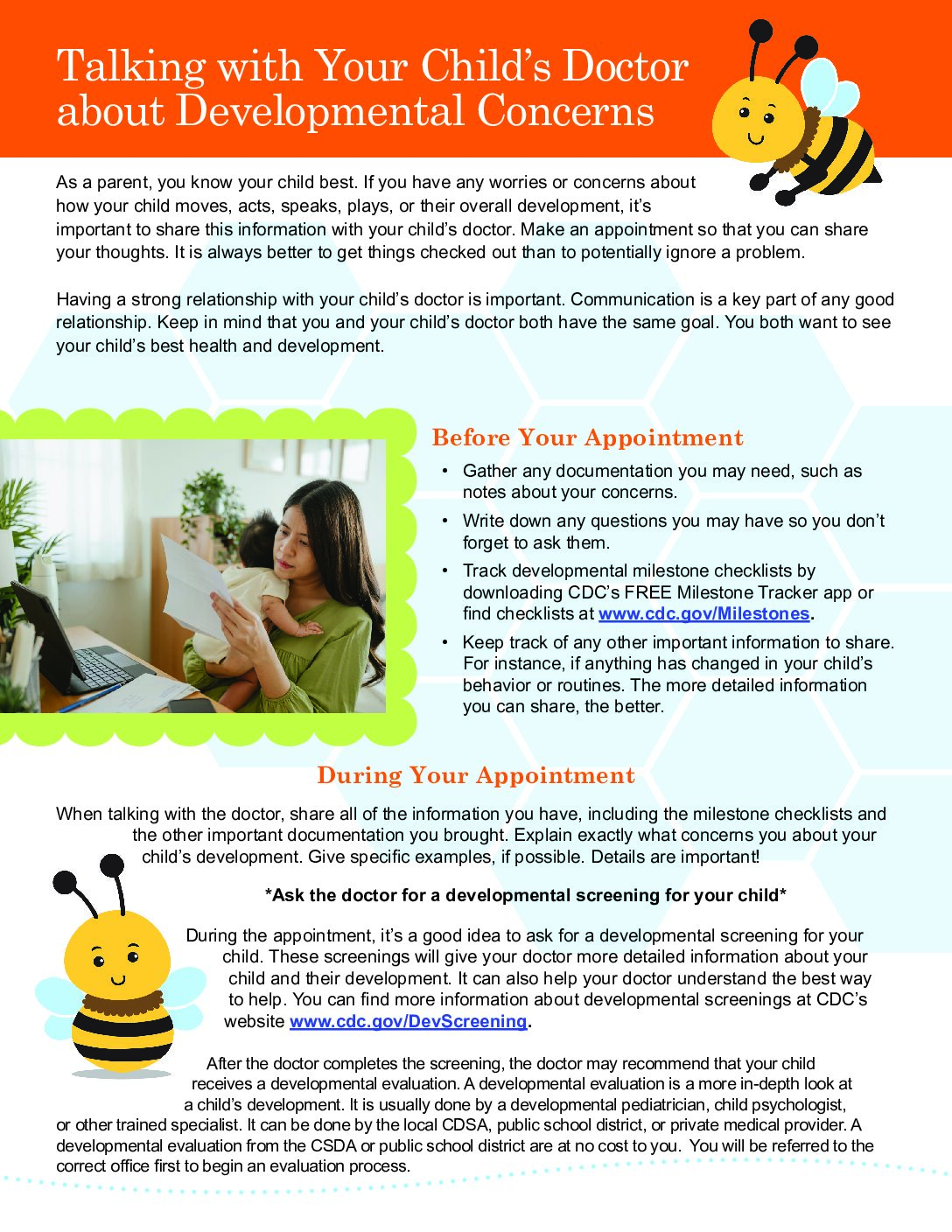
Talking with Your Child's Doctor about Developmental Concerns
As a parent, you know your child best. If you have any worries or concerns about how your child moves, acts, speaks, plays, or their overall development, it's important to share this information with your child's doctor.
Categories: Early Childhood, Early Intervention
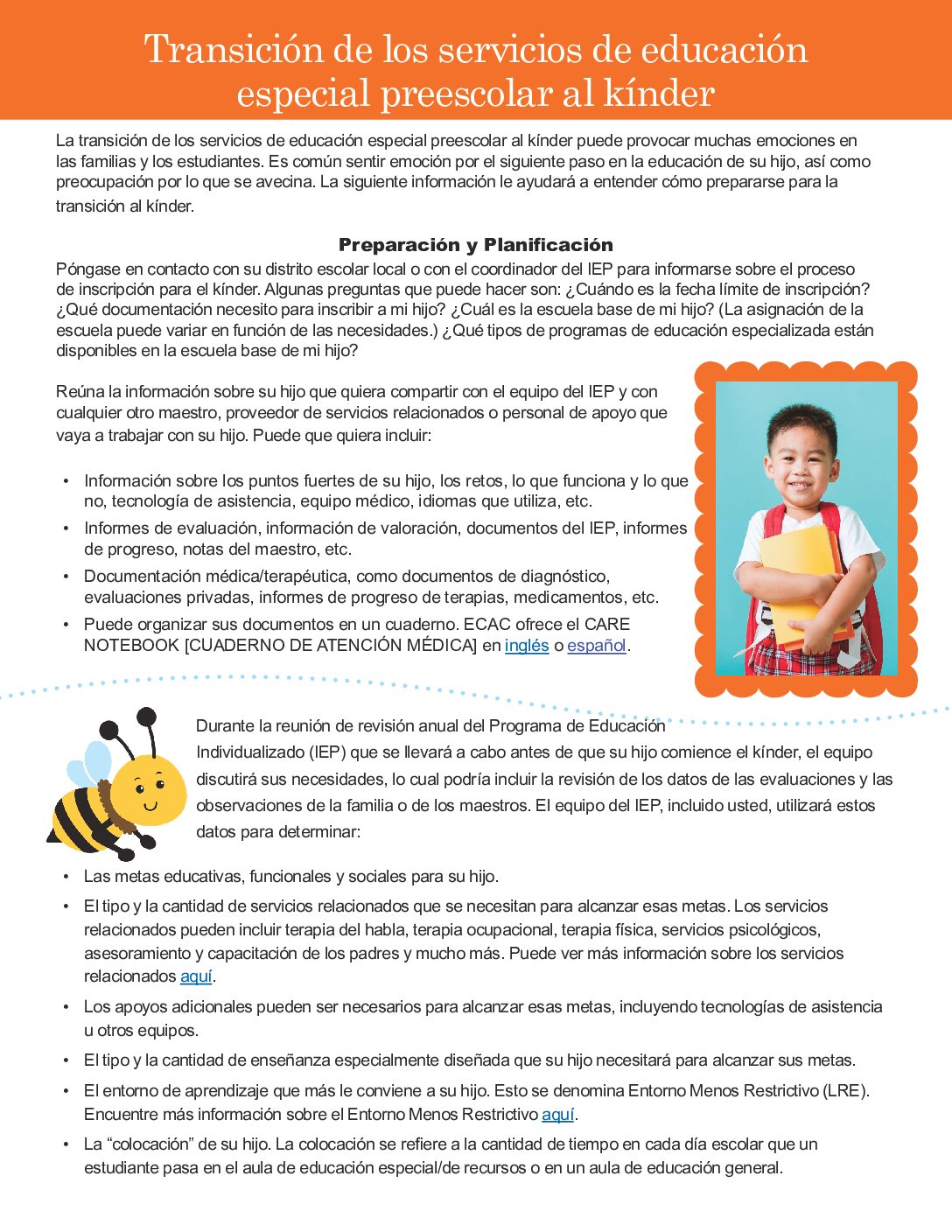
Transición de los servicios de educación especial preescolar al kínder (Transition from Preschool Special Education Services to Kindergarten)
La transición de los servicios de educación especial preescolar al kínder puede provocar muchas emociones en las familias y los estudiantes. Es común sentir emoción por el siguiente paso en la educación de su hijo, así como preocupación por lo que se avecina. La siguiente información le ayudará a entender cómo prepararse para la transición al kínder.
Categories: Early Childhood, Early Intervention, Spanish
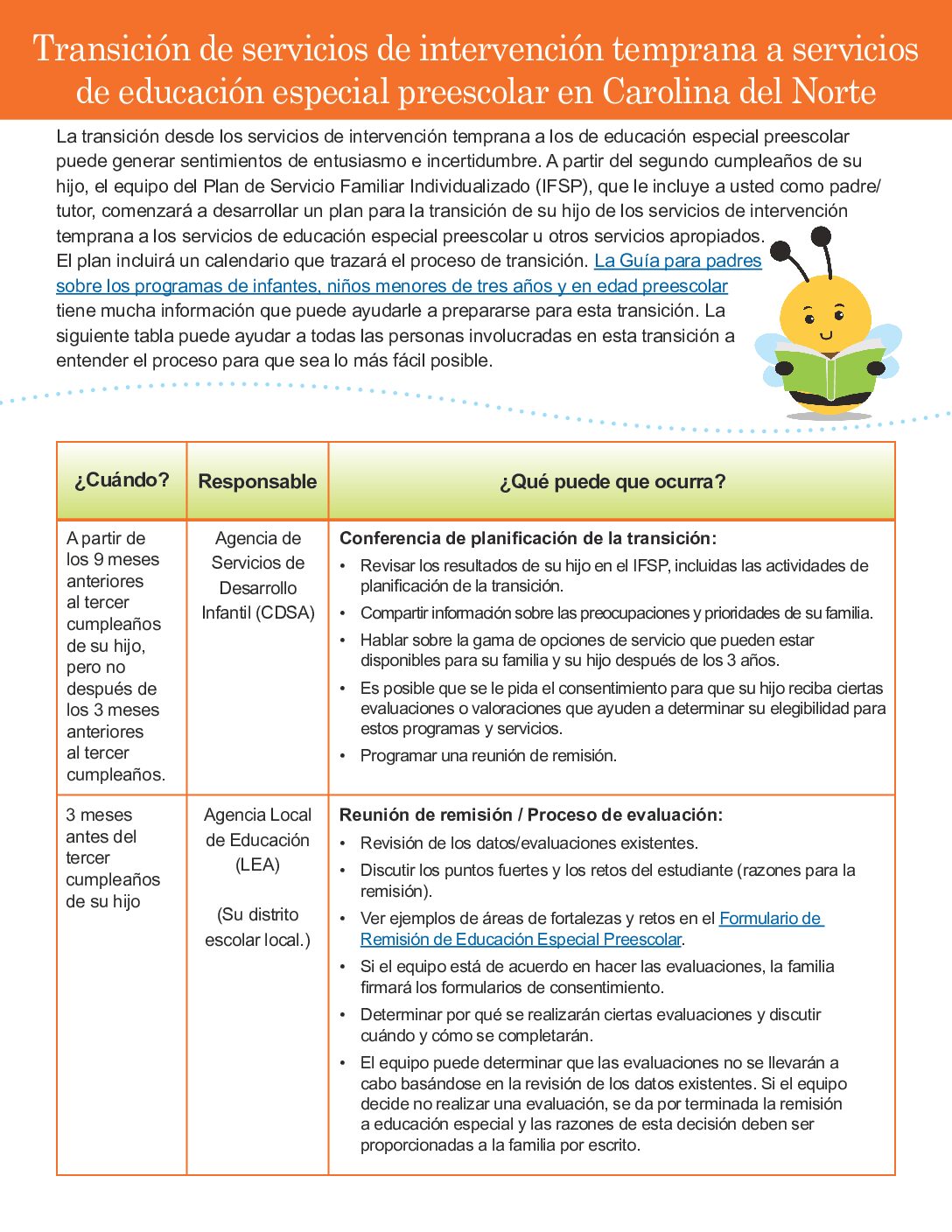
Transición de servicios de intervención temprana a servicios de educación especial preescolar en Carolina del Norte (Transition from Early Intervention Services to Preschool Special Education Services in North Carolina)
La transición desde los servicios de intervención temprana a los de educación especial preescolar puede generar sentimientos de entusiasmo e incertidumbre. A partir del segundo cumpleaños de su hijo, el equipo del Plan de Servicio Familiar Individualizado (IFSP), que le incluye a usted como padre/tutor, comenzará a desarrollar un plan para la transición de su hijo de los servicios de intervención temprana a los servicios de educación especial preescolar u otros servicios apropiados. El plan incluirá un calendario que trazará el proceso de transición. La Guía para padres sobre los programas de infantes, niños menores de tres años y en edad preescolar tiene mucha información que puede ayudarle a prepararse para esta transición. La siguiente tabla puede ayudar a todas las personas involucradas en esta transición a entender el proceso para que sea lo más fácil posible
Categories: Early Childhood, Early Intervention, Spanish
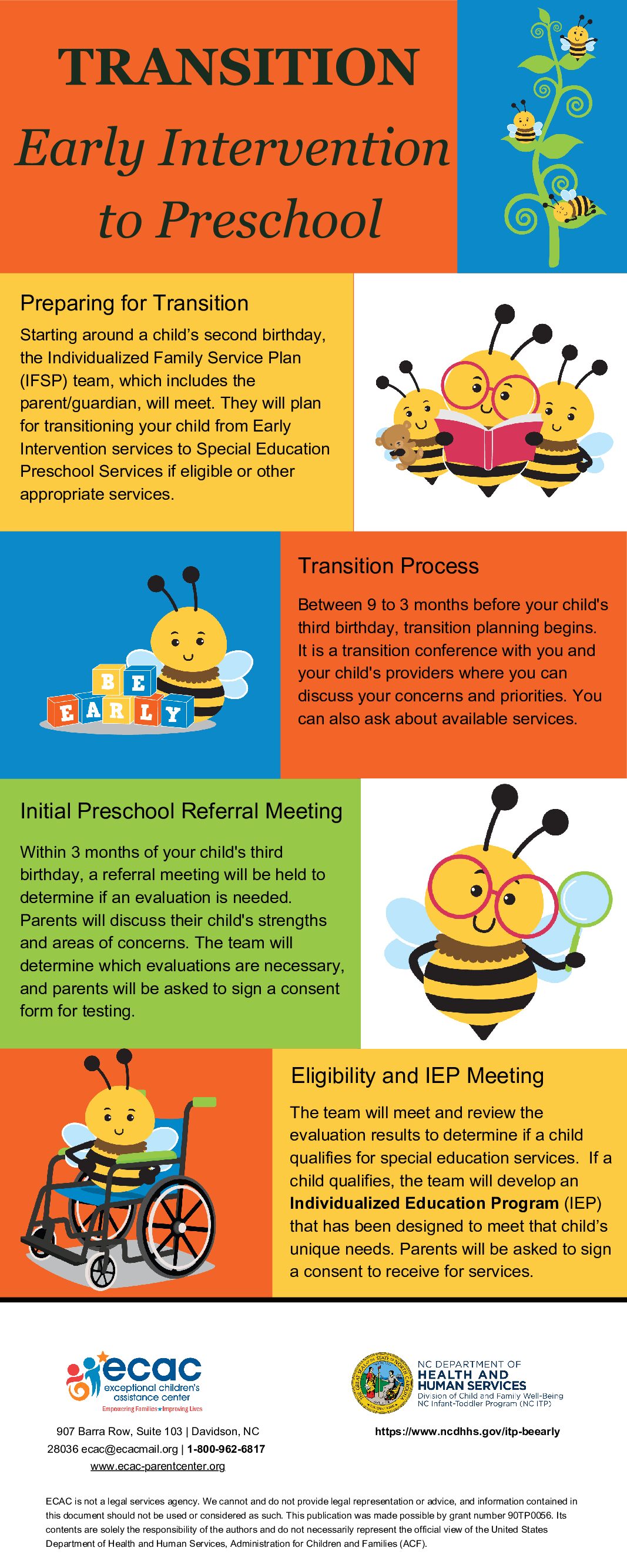
Transition from Early Intervention to Preschool Infographic
Categories: Early Childhood, Early Intervention
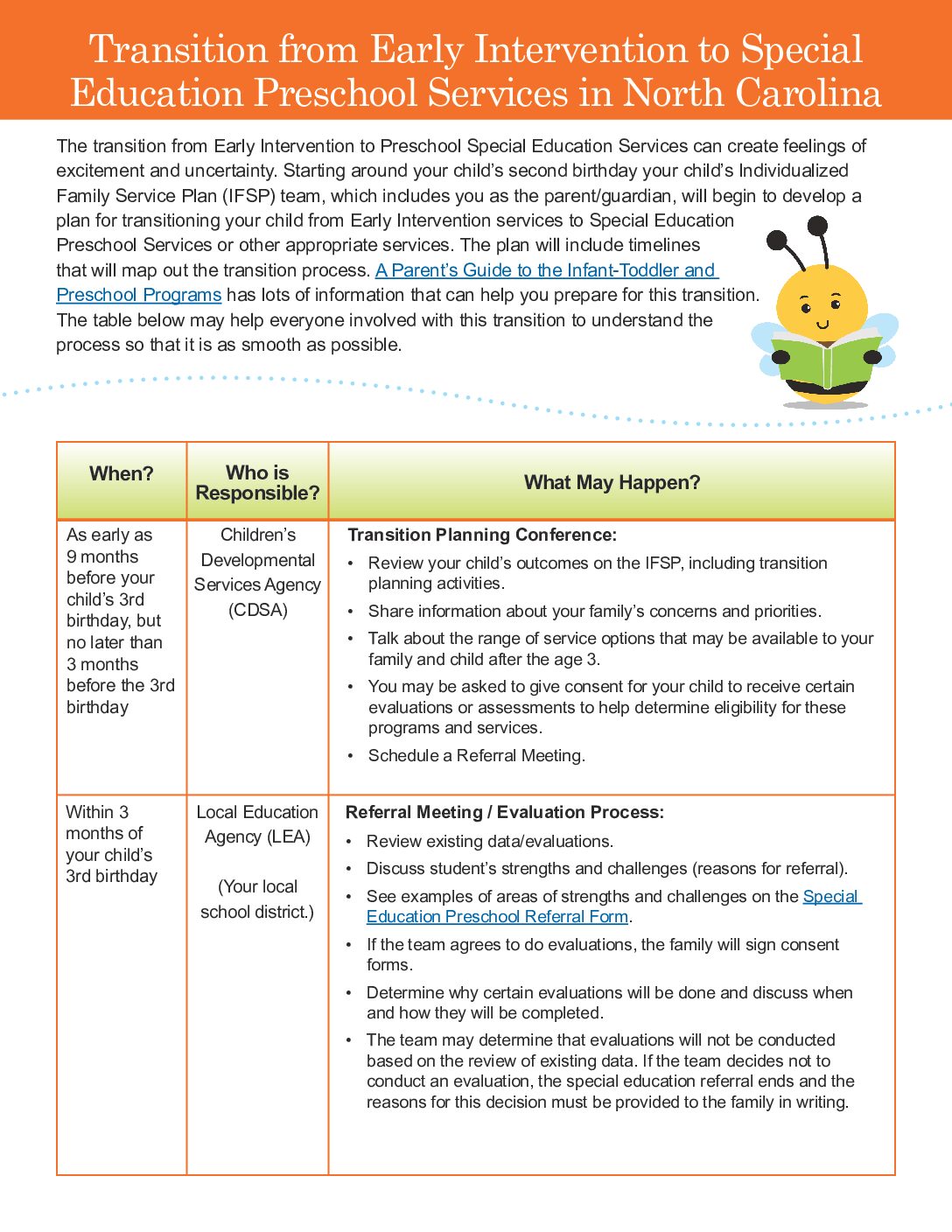
Transition from Early Intervention to Special Education Preschool Services in North Carolina
The transition from Early Intervention to Preschool Special Education Services can create feelings of excitement and uncertainty. Starting around your child’s second birthday your child’s Individualized Family Service Plan (IFSP) team, which includes you as the parent/guardian, will begin to develop a plan for transitioning your child from Early Intervention services to Special Education Preschool Services or other appropriate services. The plan will include timelines that will map out the transition process. A Parent’s Guide to the Infant-Toddler and Preschool Programs has lots of information that can help you prepare for this transition. The table below may help everyone involved with this transition to understand the process so that it is as smooth as possible.
Categories: Early Childhood, Early Intervention
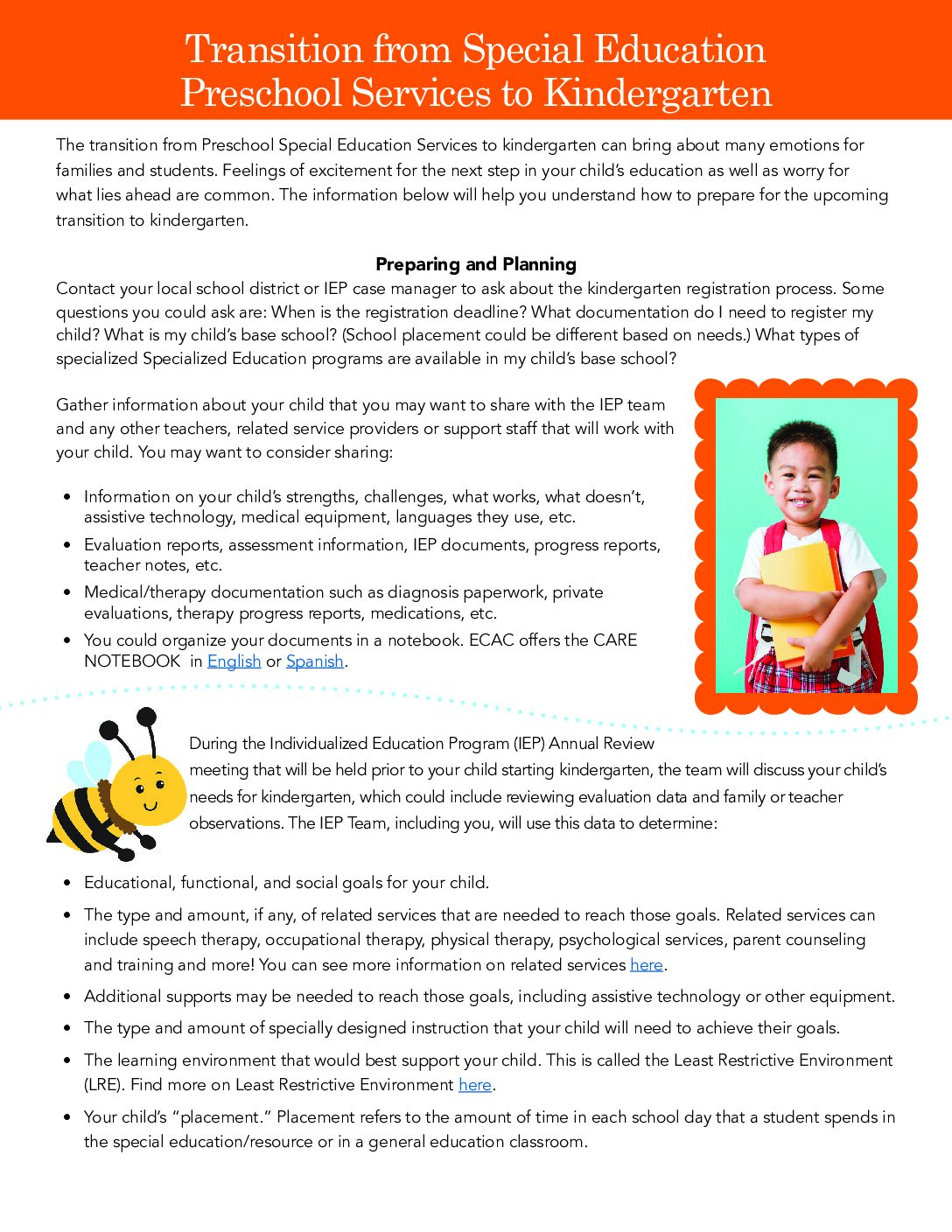
Transition from Special Education Preschool Services to Kindergarten
The transition from Preschool Special Education Services to kindergarten can bring about many emotions for families and students. Feelings of excitement for the next step in your child’s education as well as worry for what lies ahead are common.
Categories: Early Childhood, Early Intervention
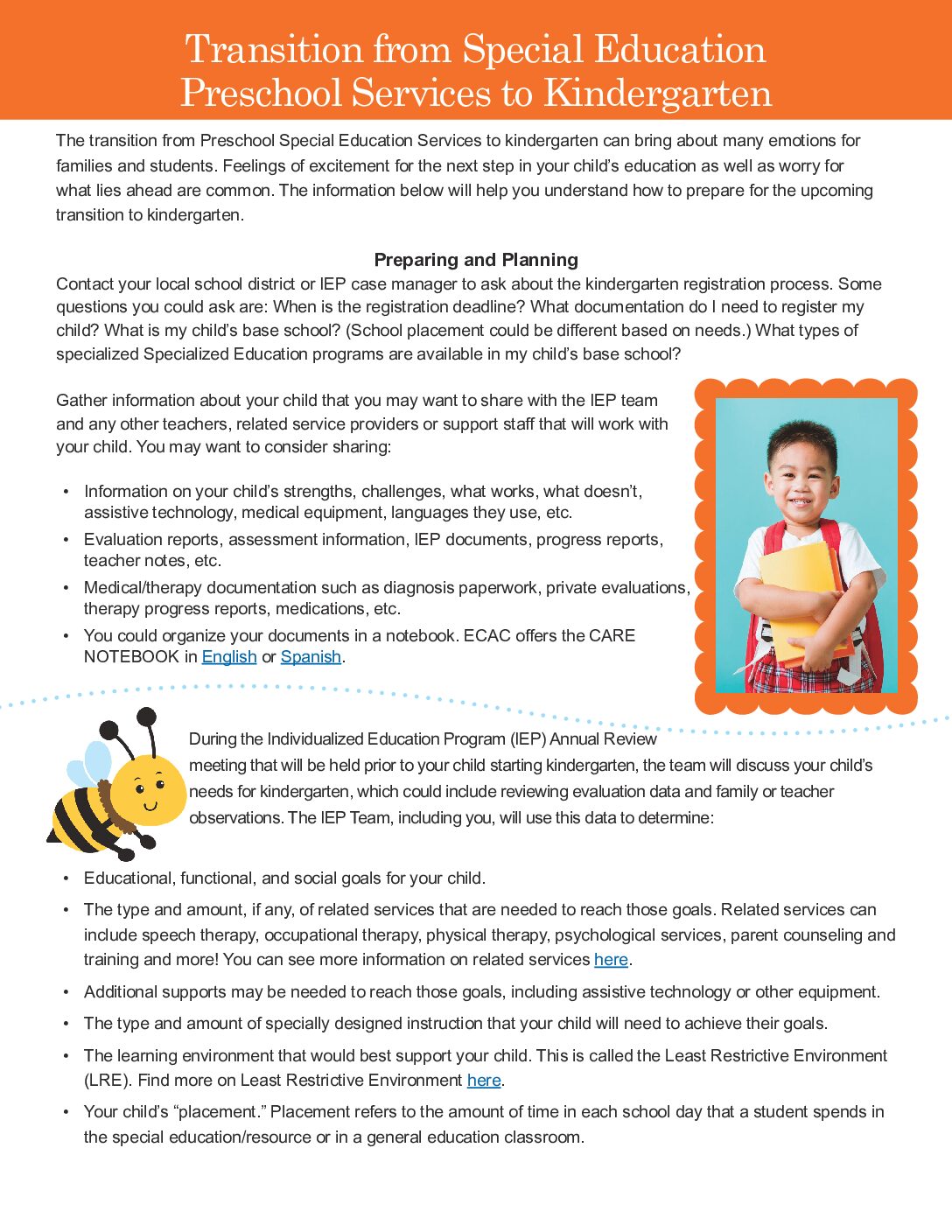
Transition from Special Education Preschool Services to Kindergarten
The transition from Preschool Special Education Services to kindergarten can bring about many emotions for families and students. Feelings of excitement for the next step in your child’s education as well as worry for what lies ahead are common. The information below will help you understand how to prepare for the upcoming transition to kindergarten.
Categories: Early Childhood, Early Intervention
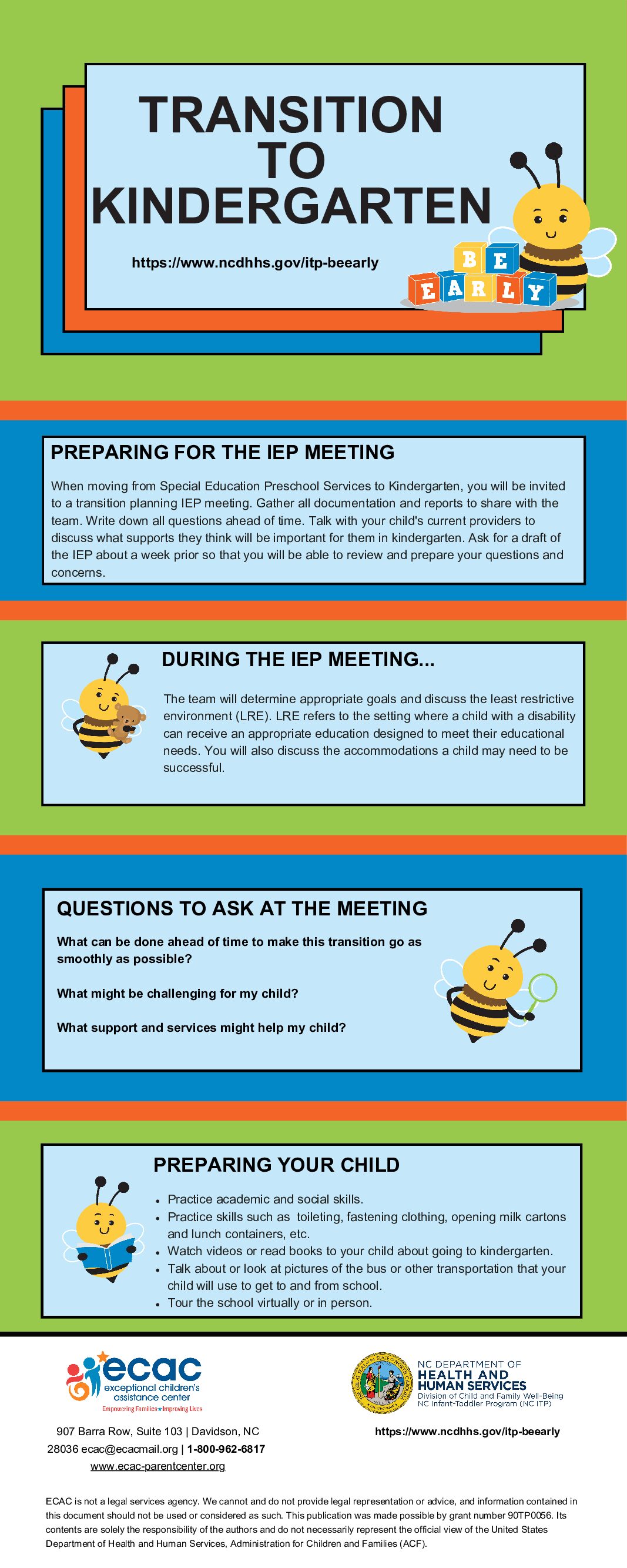
Transition to Kindergarten Infographic
Categories: Early Childhood, Early Intervention, Transitions
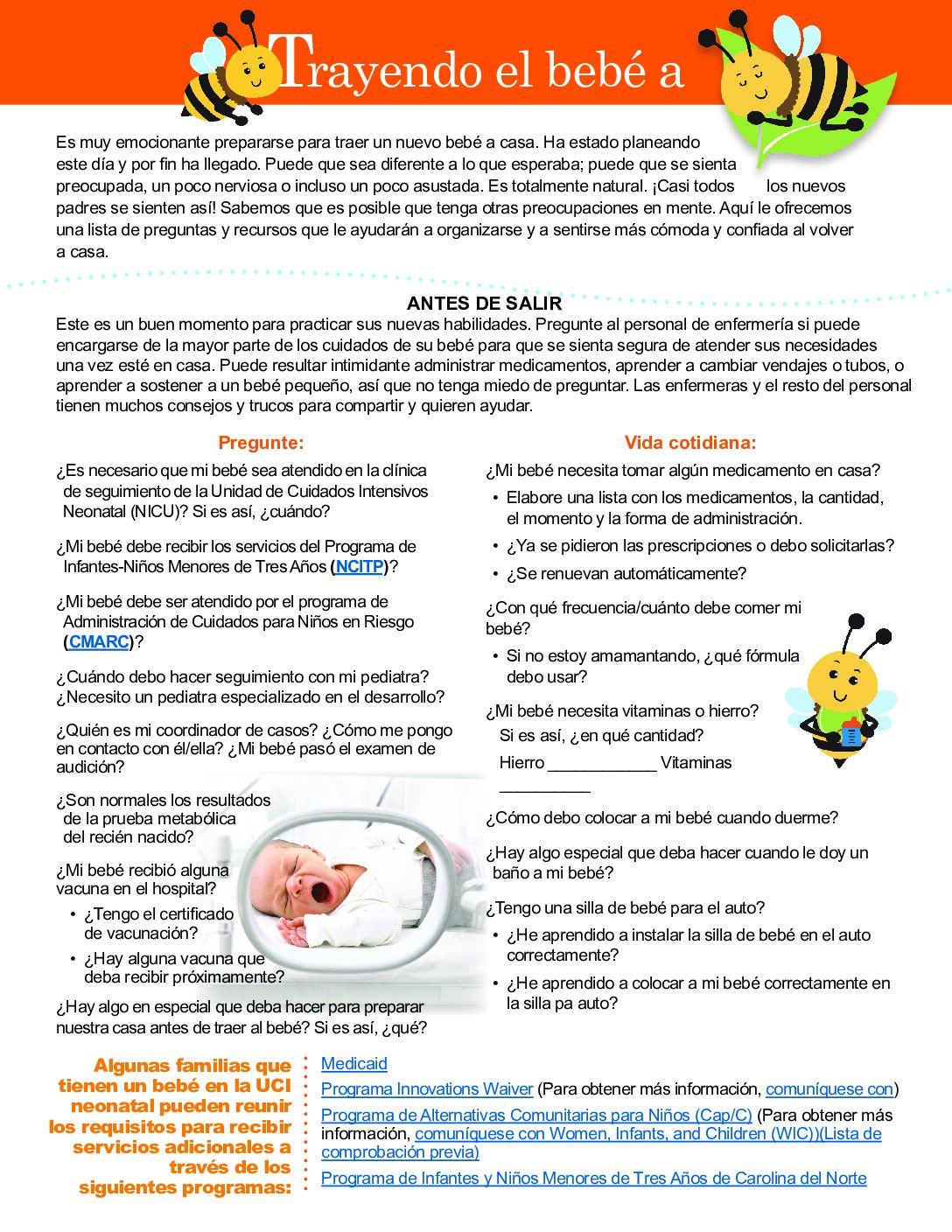
Trayendo al bebé a casa (Bringing Baby Home)
Es muy emocionante prepararse para traer un nuevco baebsé aa ca sa. Ha estado planeando este día y por fin ha llegado. Puede que sea diferente a lo que esperaba; puede que se sienta preocupada, un poco nerviosa o incluso un poco asustada. Es totalmente natural. ¡Casi todos los nuevos padres se sienten así! Sabemos que es posible que tenga otras preocupaciones en mente. Aquí le ofrecemos una lista de preguntas y recursos que le ayudarán a organizarse y a sentirse más cómoda y confiada al volver a casa.
Categories: Early Childhood, Early Intervention, Spanish
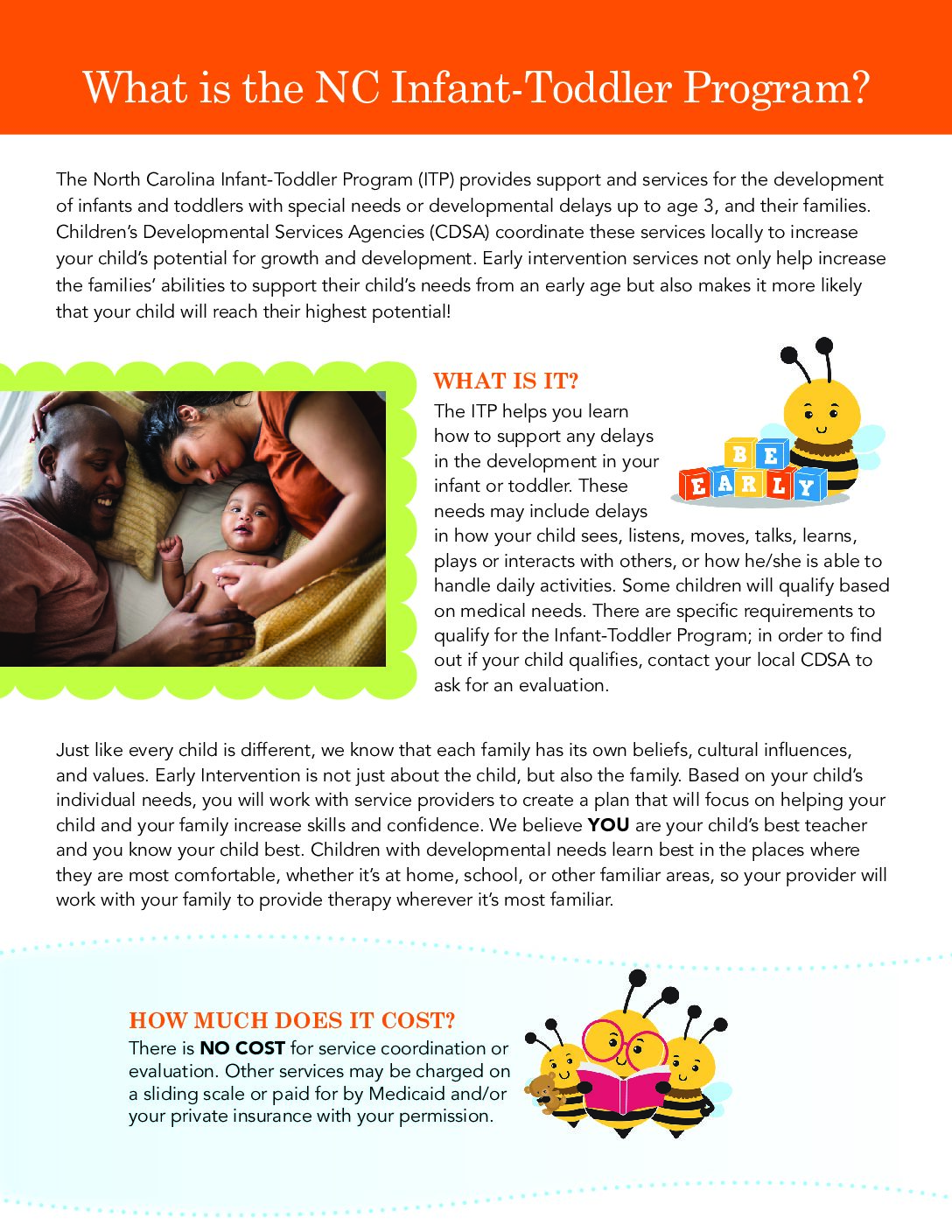
What is the NC Infant Toddler Program?
The North Carolina Infant-Toddler Program (ITP) provides support and services for the development of infants and toddlers with special needs or developmental delays up to age 3, and their families. Children’s Developmental Services Agencies (CDSA) coordinate these services locally to increase your child’s potential for growth and development
Categories: Early Childhood, Early Intervention
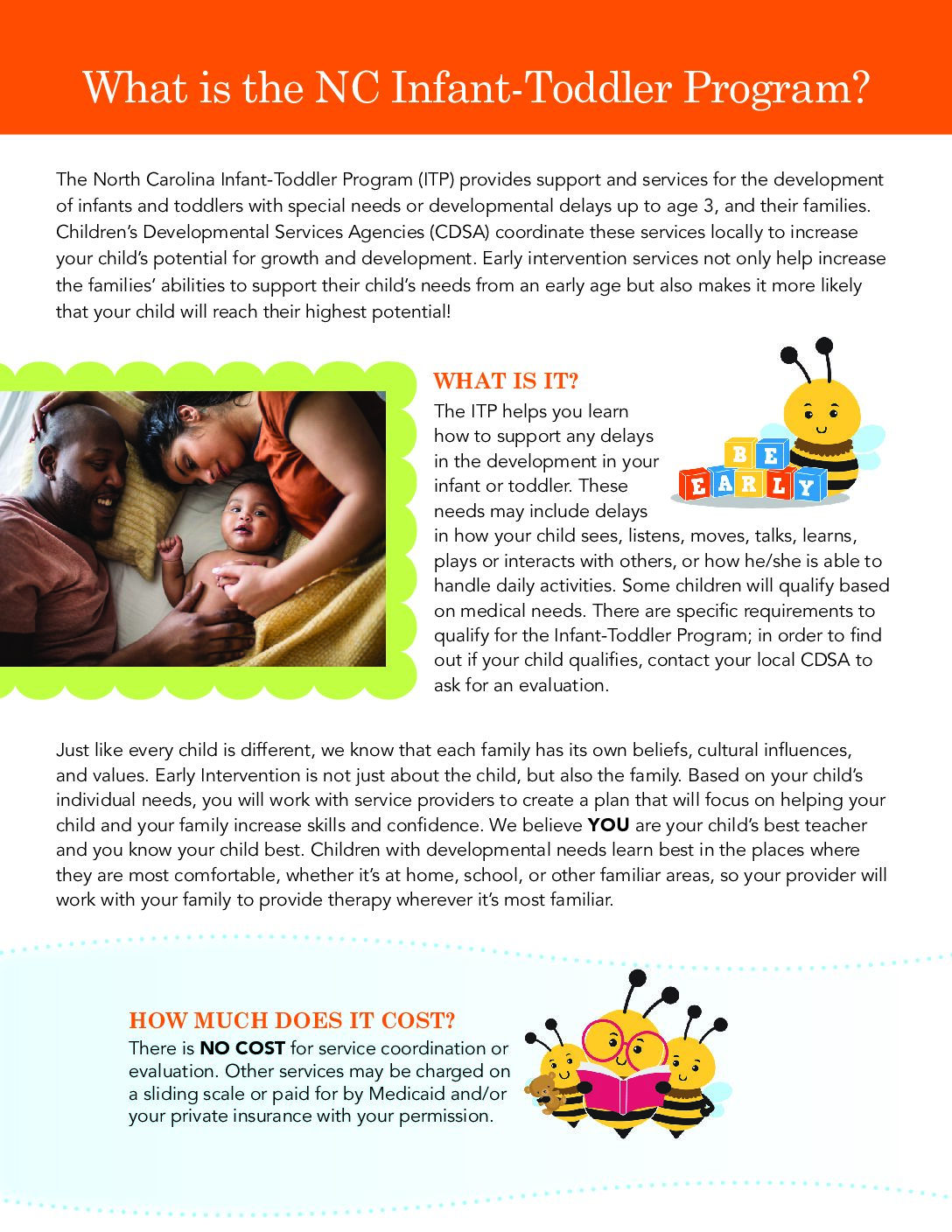
What is the NC Infant-Toddler Program?
The North Carolina Infant-Toddler Program (ITP) provides support and services for the development of infants and toddlers with special needs or developmental delays up to age 3, and their families. Children’s Developmental Services Agencies (CDSA) coordinate these services locally to increase your child’s potential for growth and development. Early intervention services not only help increase the families’ abilities to support their child’s needs from an early age but also makes it more likely that your child will reach their highest potential!
Categories: Early Childhood, Early Intervention
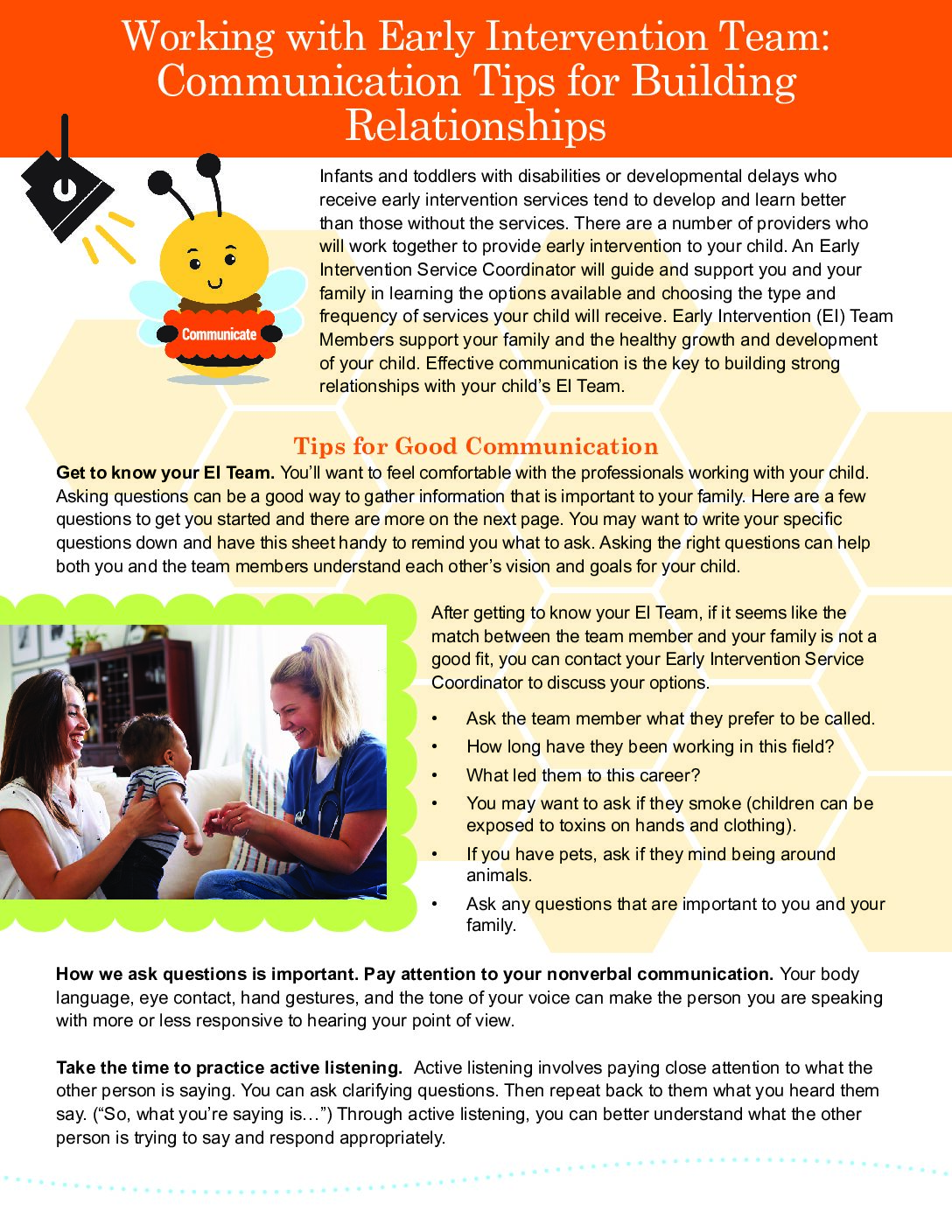
Working with Early Intervention Providers: Communication Tips for Building Relationships
Infants and toddlers with disabilities or developmental delays who receive early intervention services tend to develop and learn better than those without the services. There are a number of providers who will work together to provide early intervention to your child.
Categories: Early Childhood, Early Intervention
